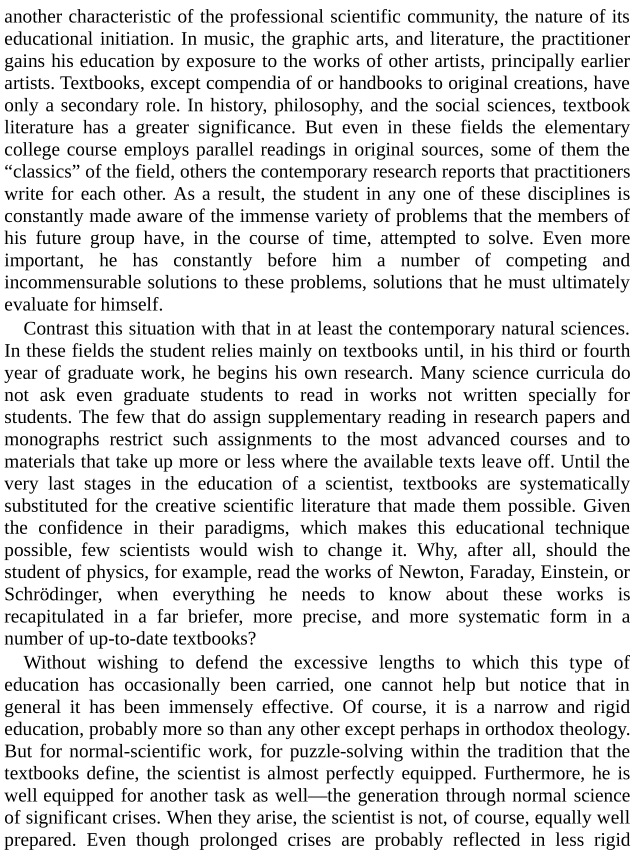Thread! Thomas Kuhn (1922-1996) was an American physicist and historian of science. In 1962 he wrote a short book (he calls it an essay) called The Structure of Scientific Revolutions. I read the 4th edition (2012) which includes his 1969 postscript. It took me about six months.
Immediate reception portrayed it as an attack on logical positivism https://en.wikipedia.org/wiki/Positivism ">https://en.wikipedia.org/wiki/Posi... which states that information derived from empirical experience, with the help of reason and logic, can lead to objective certainties. And it was a decisive blow against positivism.
However, Kuhn seems not to have seen his own project in this way, seeing it as a reinterpretation of the history of science, through an examination of the dynamics of that history. He does not view himself to be a relativist.
Instead, he primarily sees himself as battling the idea that science proceeds by a gradual and orderly succession of "discoveries." He thinks the history of science (esp. textbooks) ignores just how revolutionary and discontinuous each new period is.
Kuhn repurposes the term "paradigm" and coins "paradigm shift" to refer to the discontinuity in the "way of seeing the world" that characterises a period of "normal science," contrasting this to periodic "crises" which lead to "revolutions." These are changes in worldview.
He addresses positivism, however, which he opposes. The reasons for accusations of relativism will become clear.
Stylistically, I think Kuhn is an extremely talented writer, and an incredibly original thinker, so I highly recommend him.
Anyway, let& #39;s get started.
Stylistically, I think Kuhn is an extremely talented writer, and an incredibly original thinker, so I highly recommend him.
Anyway, let& #39;s get started.
I. A Role for History
Scientists view their history as a series of orderly/linear "achievements" toward present knowledge. But this comes from pedagogic textbooks. Reading these to learn history is like trying to understand a culture from a "tourist brochure or a language text."
Scientists view their history as a series of orderly/linear "achievements" toward present knowledge. But this comes from pedagogic textbooks. Reading these to learn history is like trying to understand a culture from a "tourist brochure or a language text."
If science is a constellation of facts/theories/methods, then a scientist is someone who strives to increase the number of these. And a historian of science describes their accumulation, and how each scientist contributes, or dismantles errors/myths/superstitions.
But a detailed analysis of the historical record (1) makes it harder, not easier, to answer apparently simple questions like: "When was oxygen discovered? Who first conceived of energy conservation?"
And (2) makes it harder to view past beliefs (e.g., Aristotelian dynamics, phlogistic chemistry, caloric thermodynamics) as "errors" or "superstition." They seem neither less scientific nor more idiosyncratic than the present set of beliefs.
(I feel like even in Wikipedia you can see a sort of rewriting of history to make it seem like "better" theories "supersede" "worse" ones:)
https://en.wikipedia.org/wiki/Aristotelian_physics
https://en.wikipedia.org/wiki/Aris... href=" https://en.wikipedia.org/wiki/Phlogiston_theory
https://en.wikipedia.org/wiki/Phlo... href=" https://en.wikipedia.org/wiki/Caloric_theory">https://en.wikipedia.org/wiki/Calo...
https://en.wikipedia.org/wiki/Aristotelian_physics
(1) If out-of-date beliefs are myths, then myths are made by the same process that now makes science.
(2) If out-of-date beliefs are science, then science has frequently held beliefs totally incompatible with what it believes today.
The historian must choose the latter.
(2) If out-of-date beliefs are science, then science has frequently held beliefs totally incompatible with what it believes today.
The historian must choose the latter.
Out-of-date beliefs are not unscientific simply because they have been discarded. But this makes it nearly impossible to view science as a process of accretion, because it seems to be punctuated by complete changes (revolutions) in belief, and not by piecemeal accumulation.
Kuhn sees history of science as itself in a revolution. Citing Alexandre Koyré, he observes a shift away from looking at Galileo’s contribution to modern science, and towards viewing him in the context of his contemporaries.
https://en.wikipedia.org/wiki/Alexandre_Koyr%C3%A9">https://en.wikipedia.org/wiki/Alex...
https://en.wikipedia.org/wiki/Alexandre_Koyr%C3%A9">https://en.wikipedia.org/wiki/Alex...
Methodology alone cannot reach any single conclusion, even given the same facts.
(To me this sounds similar to Duhem& #39;s underdetermination https://plato.stanford.edu/entries/scientific-underdetermination/">https://plato.stanford.edu/entries/s... and I& #39;d love to hear how this compares to Feyerabend whom I& #39;ve not read)
(To me this sounds similar to Duhem& #39;s underdetermination https://plato.stanford.edu/entries/scientific-underdetermination/">https://plato.stanford.edu/entries/s... and I& #39;d love to hear how this compares to Feyerabend whom I& #39;ve not read)
Scientific facts are not separable from scientific theory, except perhaps within a single tradition at a single time. Even then they may not be. This is why unexpected changes in science are never purely factual and also why revolutions qualitatively change a scientist& #39;s world.
The competition between scientific schools is between incompatible ways of seeing the world. It is not that one school is following a methodology and the other is not. Their incompatibility is not a disagreement about facts. It is about interpretation of agreed upon facts.
He uses the term "revolution" partly thanks to Copernicus, who is a good example of everyone seeing the same astronomical facts, but the Copernican revolution (1610) changed the way of viewing them.
https://en.wikipedia.org/wiki/Copernican_Revolution">https://en.wikipedia.org/wiki/Cope...
https://en.wikipedia.org/wiki/Copernican_Revolution">https://en.wikipedia.org/wiki/Cope...
He notes a conflict between the "descriptive mode" of history, and his interpretive (sometimes normative) arguments. He worries about "context of discovery" vs "justification." But this work has made him skeptical of such divisions.
https://www.mpiwg-berlin.mpg.de/research/projects/DeptII_AufrechtMonica_History
(End">https://www.mpiwg-berlin.mpg.de/research/... of I)
https://www.mpiwg-berlin.mpg.de/research/projects/DeptII_AufrechtMonica_History
(End">https://www.mpiwg-berlin.mpg.de/research/... of I)
The book on amazon:
https://amzn.to/2DHz8Th
Wikipedia:
https://amzn.to/2DHz8Th&q... href=" https://en.wikipedia.org/wiki/The_Structure_of_Scientific_Revolutions
Stanford">https://en.wikipedia.org/wiki/The_... encyclopedia on revolutions:
https://plato.stanford.edu/entries/scientific-revolutions/">https://plato.stanford.edu/entries/s...
https://amzn.to/2DHz8Th
Wikipedia:
Stanford">https://en.wikipedia.org/wiki/The_... encyclopedia on revolutions:
https://plato.stanford.edu/entries/scientific-revolutions/">https://plato.stanford.edu/entries/s...
II. The Route to Normal Science
By "normal science" Kuhn means research based on past scientific achievements which some community acknowledges for some period of time. This function was once filled directly by "classics" (Aristotle, Ptolemy, Newton, Franklin, Lavoisier, Lyell).
By "normal science" Kuhn means research based on past scientific achievements which some community acknowledges for some period of time. This function was once filled directly by "classics" (Aristotle, Ptolemy, Newton, Franklin, Lavoisier, Lyell).
Much of this is now done through textbooks, which started in the 19th C. The point of a science today (or classics previously) is to limit what questions and methods are legitimate. It& #39;s about setting boundaries.
"Achievements" which succeed in attracting an enduring group of followers, but also leave many open problems, he calls "paradigms." If they solve all problems, there& #39;s nothing for science to do. If too few join the community, then it won& #39;t become a science. Science is community.
Paradigms change worldview. E.g., optics: In his day students were taught that light is photons, which dictates research directions. But before Planck/Einstein, light was transverse wave motion (from Young/Fresnel). Before that, Newton& #39;s Opticks taught them as corpuscles.
Notice light went from particles, to waves, back to particles. This is characteristic of revolutions. However, before Newton, there was no such consensus. He calls this "pre-paradigm science," in which e.g. Epicurean/Aristotelian/Platonic schools persist, sometimes for millennia.
At various times, all of these schools made significant contributions. Newton is unthinkable without their experiments (he rather famously said so https://en.wikipedia.org/wiki/Standing_on_the_shoulders_of_giants).">https://en.wikipedia.org/wiki/Stan...
"Any definition of the scientist that excludes at least the more creative members of these various schools will exclude their modern successors as well. *Those men were scientists.*" But despite them behaving just like modern scientists, the "net result" was "less than science."
As Kuhn sees it, the problem is lack of consensus. Because they could not take even fundamentals for granted, every text started from scratch. They bickered constantly about ontology. They argued with each other more than they looked to nature.
E.g., in 1700-1750 about the debates about electricity: Hauksbee, Gray, Desaguliers, Du Fay, Nollett, Watson, Franklin, others. All were about electricity, and were derived from Newtonian mechanico-corpuscular theory. But their theories weren& #39;t remotely similar.
Eventually, Franklin& #39;s school and its successors, who looked at electricity as a fluid, came up with experiments which could account (nearly) for attraction, friction, repulsion, conduction. This paradigm isn& #39;t "true"; it just leads to experiments that explain a lot.
If you exclude math/astronomy, where first paradigms are prehistoric, and e.g. biochemistry, which results from recombination of existing sciences, the electricity debates are typical. Lots of competing schools, then one gains pre-eminence as a result of experimental success.
In the absence of a paradigm, fact-gathering is random. Everything seems equally relevant. Very old science is a mere collection of miscellany (Pliny, Bacon). Often facts come from wherever they are abundant; this means tech often produces new facts, which produce new sciences.
Facts require interpretation however. And interpretation requires theory. Pre-paradigm, scientists will make them up, borrow them from metaphysics or other sciences. Scientists observe the same natural phenomena, and give wildly different accounts of what is going on.
What is remarkable about science is not that these disagreements exist. It is that they eventually disappear. "For they do disappear to a very considerable extent and then apparently once and for all." This does not happen, e.g., in philosophy or the arts.
What is even more surprising is that one of the pre-paradigm schools gains preeminence, and triumphs. It is not a brand new unifying theory or anything like that. It& #39;s one of the random bickering theories.
"Fluid" theories of electrity triumphed not because they were true, but because they led to idea of "bottling" electricity. After this theory (really just a metaphor?) the Leyden Jar was developed independently, simultaneously by at least two investigators in 1740s.
(Seems like he& #39;s suggesting ideas are extremely contagious, travel far faster than we typically imagine, and this may explain why scientific discoveries are so often made apparently independently and simultaneously in different parts of the world.)
Paradigm science is much more effective than pre-paradigm science in part because the debate about fundamentals cease. Experiments become unidirectional and cooperative. A paradigm unites experimenters, making activity highly directed.
When a school "achieves" such an experiment, it attracts most of the new generation of experimenters. The other schools tend to disappear as new students learn the paradigm. Old holdouts return to philosophy departments (which usually spawned the schools in the first place).
A new paradigm often transforms a community of enthusiasts into a discipline, with journal, societies, curriculum. This is different from law, medicine, technology, where it is not epistemology but social/practical need which drives a discipline.
Paradigm also relieves practitioners from the need to keep explaining fundamentals. That can be left to textbook writers. Thus the nature of science is to extend what exists, and to concentrate on the "most esoteric aspects." A scientist only writes for specialists.
In a mature science, texts are not (like Franklin& #39;s Experiments or Darwin& #39;s Origin of Species) addressed to the laiety. They are directed at specialists, who are assumed to speak the language. The brevity of articles to people who already largely agree saves time/effort.
If a scientist writes a text to the laiety, it is either a retrospective reflection or autobiographical; both tend to harm rather than help his reputation. Pre-paradigm, the book (as opposed to article) possesses the same prestige as in other creative fields. But not after.
(If books are being written, he implies, that science is not mature. Reminds me of Embodied Mind, The Origins of Order, How Nature Works, Antifragile, etc. And the layperson can follow progress without intermediaries because of this immaturity.)
Math and astronomy stopped being accessible to untrained laypeople in antiquity. Dynamics in the Middle Ages. Electrical research, end of 18th C. Most other physical sciences by the end of the 19th. Parts of the social sciences, that is happening today (i.e. 1962).
So, electricity: between 1740-1780, practitioners had fundamentals hashed out; they pushed on to more recondite problems. In this way, they had reached what astronomers reached in antiquity, students of motion in Middle Ages, optics in 17C, and geology in 19C.
(End of II)
(End of II)
III. The Nature of Normal Science
The term paradigm means "paradigmatic," like "amo, amas, amat" in Latin: You can use it to know how other verbs (which replace it) work. But scientific paradigms are not frequently replaced. Instead, they are meant to be "articulated."
The term paradigm means "paradigmatic," like "amo, amas, amat" in Latin: You can use it to know how other verbs (which replace it) work. But scientific paradigms are not frequently replaced. Instead, they are meant to be "articulated."
When it first appears, a paradigm need not solve more than a few problems. It is the _promise_ that it will solve more that unites people behind it. "Normal science" is extending or articulating the paradigm. (Applying Newton to new areas, e.g.)
So: pre-paradigm debate (or crisis leading to next paradigm). Debate is settled when most adopt a paradigm. Then normal science articulates/extends that paradigm. This is "mop-up" work, which can be considerable and fascinating, but non-scientists don& #39;t know how much there is.
Normal science never tries to discover new phenomena to challenge its paradigms or dream up "new theories" as in the popular imagination. Instead, it does narrow puzzle-solving in a scope now limited by the new paradigm. But this produces extreme depth, detail, and rigour.
(Already, there& #39;s the sense that practitioners have to adhere to rules/standards, to "speak the same language." Commitment to a fixed idea is a pre-requisite to be part of the community. And it& #39;s clear it will be hard to challenge the received wisdom.)
He goes into a lot of detail about the proportion of types of facts gathered by "normal science." Three types:
(1) determination of which facts are significant
(2) matching facts with theory (hard)
(3) articulation of theory (extending it to new problems, which is the biggest)
(1) determination of which facts are significant
(2) matching facts with theory (hard)
(3) articulation of theory (extending it to new problems, which is the biggest)
The point is that *most* science is devoted to narrow and well-defined areas. Usually, to stray outside of this is to abandon science. But of course, extraordinary discoveries/revolutions do occur, and they require desertions. Before that, more on normal science.
(End of III)
(End of III)
IV. Normal Science as Puzzle-Solving
Normal research does *not* seek novelty. E.g., measuring wavelength: everything but the most minute detail is known. Sometimes, mild surprise (Coulomb& #39;s law as inverse square). But nothing mindblowing.
https://en.wikipedia.org/wiki/Coulomb%27s_law">https://en.wikipedia.org/wiki/Coul...
Normal research does *not* seek novelty. E.g., measuring wavelength: everything but the most minute detail is known. Sometimes, mild surprise (Coulomb& #39;s law as inverse square). But nothing mindblowing.
https://en.wikipedia.org/wiki/Coulomb%27s_law">https://en.wikipedia.org/wiki/Coul...
Not only does normal science not seek novelty, but it cannot even see novelty when it arises:
If your results are mindblowingly out of range, you blame your instruments or experimental design. At best, you record them as an oddity. You do not question the received paradigm.
If your results are mindblowingly out of range, you blame your instruments or experimental design. At best, you record them as an oddity. You do not question the received paradigm.
What motivates normal science is *not* knowledge. After all, constants/results are tightly circumscribed.
The motivation is puzzle-solving. This requires new apparatus to be built, new tech. The appeal is like a jigsaw or crossword puzzle, not like an Arctic expedition.
The motivation is puzzle-solving. This requires new apparatus to be built, new tech. The appeal is like a jigsaw or crossword puzzle, not like an Arctic expedition.
Many pressing problems (war, cancer) are not puzzles at all, because they may have no solution. A puzzle means a solution is assured. Puzzles test skill and ingenuity.
Only solvable problems are considered scientific. Other problems, even those formerly considered solvable (by an older paradigm) will be relegated to metaphysics or to other disciplines if they seem intractable in principle.
This is why normal science makes such rapid progress. Its practitioners focus exclusively on well-defined problems, guaranteed to have a solution, which lack only ingenuity to solve. Everyone is focused. (If it is not like this, then that science is pre-paradigm, or in crisis.)
Science as a whole may do things very different from what any of its individual practitioners do. (Science as a whole exhibits emergent behaviour?)
Normal science places constraints not just on the fact that there must be some solution, and that any solution must fit the paradigm. It also dictates what solutions would be permissible (often within some narrow range).
This isn& #39;t & #39;Nam. There are rules.
This isn& #39;t & #39;Nam. There are rules.
Jigsaw as science: The goal is not "make a picture." If it were, one could scatter pieces randomly. It might be better, and would certainly be more original. But it would not be a solution, because a solution requires that the pieces fit together, picture side up, etc.
He gives several examples in science. One: After Descartes, everything is corpuscles in motion. If you challenged that, you would not have been a scientist. This entails a set of metaphysical, conceptual, instrumental, methodological commitments, and dictates research problems.
There are "higher level" commitments too, e.g. that scientists must examine/scrutinise the world, extend precision and scope.
Rules come from paradigms. But paradigms can also guide science in the absence of rules.
(End of IV)
Rules come from paradigms. But paradigms can also guide science in the absence of rules.
(End of IV)
Some random points:
W/o paradigm, fact-finding is a morass. They mix extremely basic and extremely complex phenomena, and they leave out things that can& #39;t be known to be related yet. For example, static electricity: chaff bounces off electrified bodies. This seemed mechanical.
W/o paradigm, fact-finding is a morass. They mix extremely basic and extremely complex phenomena, and they leave out things that can& #39;t be known to be related yet. For example, static electricity: chaff bounces off electrified bodies. This seemed mechanical.
This random fact gathering produces the early schools. To become a paradigm, the school needs to *seem* superior. To become the paradigm, it need not—in fact, cannot—answer everything. (If it does, there& #39;s nothing left to do.) It& #39;s not about "truth" (a word he never uses).
A paradigm allows practitioners to skip the debates about fundamentals, without explaining or justifying anything (that& #39;s done in textbooks). This is more time efficient, and reminds me of cumulative culture: https://www.nationalgeographic.com/science/phenomena/2012/03/01/why-humans-stand-on-giant-shoulders-but-chimps-and-monkeys-dont/">https://www.nationalgeographic.com/science/p...
This means a tendency to develop insider language; translation is required (for the laity or other sciences). People lament specialisation, but for Kuhn this is the definition of a mature science. It& #39;s precisely this specialisation/exclusion/isolation that allows rapid progress.
(Kuhn does not really take the language comparison too far in the main text. But to me, his description of the splitting of the sciences sounds a lot like the divergence of a proto-language into daughters; more translation is required the longer they& #39;re separated.)
(It& #39;s clear by this point the extent to which Kuhn thinks science is marked by confirmation bias, because of the illusion that past thinkers predict the present paradigm, and survivorship bias, because the non-paradigm schools are forgotten. The winners write the textbooks. )
V. The Priority of Paradigms
So for Kuhn, a scientific paradigm is like a worldview. Normally it involves rules, as I said yesterday, though it can be hard to say exactly what these rules are.
So for Kuhn, a scientific paradigm is like a worldview. Normally it involves rules, as I said yesterday, though it can be hard to say exactly what these rules are.
Rules definitely exist, at least in a mature scientific paradigm, but phrased strongly, some community members (who, by definition of being a part of that community, accept the paradigm) might reject them.
Agreement on rules, however, is not necessary for a paradigm to unify/guide research, because the paradigm can inspire or catalyze research directly.
How can this happen? And what does "direct inspiration by paradigm mean"?
How can this happen? And what does "direct inspiration by paradigm mean"?
In a move I didn& #39;t expect, Kuhn goes straight to Wittgenstein& #39;s Philisophical Investigations to explain why this is hard to answer  https://abs.twimg.com/emoji/v2/... draggable="false" alt="😅" title="Lächelndes Gesicht mit offenem Mund und Angstschweiß" aria-label="Emoji: Lächelndes Gesicht mit offenem Mund und Angstschweiß">
https://abs.twimg.com/emoji/v2/... draggable="false" alt="😅" title="Lächelndes Gesicht mit offenem Mund und Angstschweiß" aria-label="Emoji: Lächelndes Gesicht mit offenem Mund und Angstschweiß">
Words like "leaf" or "game" are very hard to define exhaustively and unnambiguously. The old conclusion was that we must have some intuition about what each word means. More specifically, we must grasp whatever set of characteristics a "game," for example, has.
But Wittgenstein showed that there need not be any such set of characteristics that all games, and only games, have: "There is no set of characteristics that is simultaneously applicable to all members of a class and to them alone."
Instead, we see that games bear some kind of "family resemblance" to one another, and we learn to recognise them through examples. It is not box-ticking. It& #39;s more like how we might recognise that two people are related. You might say "It& #39;s the ears" but that& #39;s not exhaustive.
Which problems a science seeks to solve is also like this. It& #39;s not about satisfying an objective list of criteria. Such a list will likely not exist. It& #39;s more like a family of problems that are recognisably similar even if you can& #39;t quite put your finger on how they relate.
The coherence of a scientific research tradition does not require any explicit set of rules, and science can proceed without them, however the philosophers or historians might subsequently feel about all this.
It kind of reminds me of how you can use a word correctly without knowing anything about its etymology or provenance, or even without being able to define it exactly.
Kuhn& #39;s claim that paradigms directly motivate research w/o rules may seem abstract. But to increase urgency/clarity, here are two reasons for believing they might work this way:
1. It& #39;s hard to list rules that every scientist agrees on (see Wittgenstein on definitions).
1. It& #39;s hard to list rules that every scientist agrees on (see Wittgenstein on definitions).
2. Scientists never learn concepts, laws, or theories in the absence of examples or applications to natural phenomena. Without applications, a theory could never even be a candidate for acceptance. After acceptance, these examples will forever accompany their teaching.
Scientists learn by doing. Or if not by doing, by practical applications to problems. You can& #39;t understand Newton, he argues, just from definitions of "force," "mass," "space," "time." You have to observe problem-solving and then solve problems yourself.
Over time, the problems a scientist solves will get more complex and less completely precedented. But they still bear a similar relationship to the paradigm achievements of the past that the simple problems do. This is not just as a student, but as a practicing professional.
It would be tempting to assume that a scientist, through intuition/experience, gains an implicit abstraction of the rules of the game. But he says that in fact, scientists are no better than laypeople are at exhaustively defining what& #39;s in/out of their science and why.
That& #39;s in spite of the fact that they can do research well, and speak fluently and coherently about individual hypotheses and cases.
(Basically, it& #39;s a problem that definitions are hard, but they seem not to be necessary for fruitful action. Maybe in an analogous way to how an artist can paint without any explicit aesthetic philosophy? It& #39;s a case of language vs action, or episteme vs techne?)
(Somewhere here is also probably where Michael Polanyi& #39;s idea of tacit knowledge comes in)
https://infed.org/mobi/michael-polanyi-and-tacit-knowledge/">https://infed.org/mobi/mich... @TrailMarks
https://infed.org/mobi/michael-polanyi-and-tacit-knowledge/">https://infed.org/mobi/mich... @TrailMarks
For Kuhn, the lack of rules leads to tacit knowledge, and tacit knowledge leads to a third reason to suppose paradigms motivate research directly: Normal science will proceed without rules only so long as the community accepts _without question_ the problem-solutions achieved.
(In other words, the paradigm halts bickering about fundamentals, encourages collaboration, and causes people to do experiments. It& #39;s the unidirectionality of the consensus that makes a paradigm powerful.) https://twitter.com/bryankam/status/1303728477930217474">https://twitter.com/bryankam/...
(He does not say this yet, but there& #39;s a strong sense here that _paradigms have no truth value_. A new paradigm is not any closer to the "truth" than the last one. It& #39;s just a worldview that happens to be useful for coordinating activity.)
(That is *not* to say that all candidates for paradigm are equally powerful, or that "you can believe whatever you want." Paradigms are picked by something like evolutionary selection. The best paradigm "wins" because it provides the best path forward to investigate nature.)
(There& #39;s an unstated connection here to The Republic of Science, where Michael Polanyi argues that science is like a canon of expert consensus, which also equips its acolytes later to challenge that consensus — very unlike Church dogma:
http://itech.fgcu.edu/faculty/bhobbs/Polanyi%201962%20The%20Republic%20of%20Science.pdf">https://itech.fgcu.edu/faculty/b... @atroyn )
http://itech.fgcu.edu/faculty/bhobbs/Polanyi%201962%20The%20Republic%20of%20Science.pdf">https://itech.fgcu.edu/faculty/b... @atroyn )
(Nature, for Kuhn, definitely exists and has regularities. This is why science can work at all. But he is very skeptical that human paradigms, which are ultimately constructs, have any relation to "truth," or that "truth" need exist for nature to have investigable regularities.)
If Kuhn is right, he writes, then the scientific community should operate without rules for as long and far as it can, and rules should become important only when a paradigm (or its model problem/solutions) feels insecure.
"That is, moreover, exactly what does occur."
"That is, moreover, exactly what does occur."
Before a paradigm forms, we see a huge debate from different schools about the legitimacy of methods, problems, solutions. These debates define schools rather than produce agreement.
Once a school kills off its competitors, and becomes paradigm, this debate ceases.
Once a school kills off its competitors, and becomes paradigm, this debate ceases.
Dissenters return to philosophy departments, and normal science proceeds rapidly according to the paradigm, w/o explicit rules.
https://twitter.com/bryankam/status/1304044606141628421
Debates">https://twitter.com/bryankam/... about fundamental questions never cease entirely however, and they re-emerge before and during scientific revolutions.
https://twitter.com/bryankam/status/1304044606141628421
Debates">https://twitter.com/bryankam/... about fundamental questions never cease entirely however, and they re-emerge before and during scientific revolutions.
Science can continue without rules only when previous results and example problem/solutions are unquestioned.
(Later he& #39;ll make this more explicit: Science is defined as those disciplines which progress rapidly and without debating fundamentals. Recall: https://twitter.com/bryankam/status/1303688433043476482)">https://twitter.com/bryankam/...
(Later he& #39;ll make this more explicit: Science is defined as those disciplines which progress rapidly and without debating fundamentals. Recall: https://twitter.com/bryankam/status/1303688433043476482)">https://twitter.com/bryankam/...
When debates over whether fundamental problems have been solved, the search for rules gains a different function, which is to set up competing schools which will provide potential paradigms for the next shift.
There is a fourth and final reason to believe that paradigms precede and to some extent are separate from rules.
This is because science is much more "ramshackle" than has so far been implied. Explicit rules may apply broadly across a discipline, while paradigms remain small.
This is because science is much more "ramshackle" than has so far been implied. Explicit rules may apply broadly across a discipline, while paradigms remain small.
For example, all physicists will learn quantum mechanics. But the problem-solution sets vary based on whether they& #39;re specialising in solid state physics, atomic physics, molecular physics, particle physics, etc. Each subspecialty may work under its own paradigm.
The "laws" or "rules" apply to big swathes of science. But their applications are much narrower. So revolutions/paradigm shifts can occur within a (sub)specialty or specialty without affecting other (sub)specialties at all.
He gives an example of how different sciences differ in their ways of seeing things under separate paradigms. Wishing to learn about atomic theory, an investigator asked "a distinguished physicist and an eminent chemist" whether a single helium atom was a molecule or not.
Without hesitation, the chemist said yes, and the physicist said no.
For the chemist, a single helium atom behaves like a molecule with respect to the kinetic theory of gases.
For the physicist, the atom does not behave like a molecule, because it shows no molecular spectrum.
For the chemist, a single helium atom behaves like a molecule with respect to the kinetic theory of gases.
For the physicist, the atom does not behave like a molecule, because it shows no molecular spectrum.
Experience and their paradigm (worldview) told them what a molecule must be. But they gave opposite answers, which shows that these paradigms do not necessarily converge on answers, even for apparently straightforward questions.
VI. Anomaly and the Emergence of Scientific Discoveries
Normal science proceeds rapidly (thanks to consensus on fundamentals) and expands the scope and precision of scientific knowledge. https://twitter.com/bryankam/status/1303728477930217474">https://twitter.com/bryankam/...
Normal science proceeds rapidly (thanks to consensus on fundamentals) and expands the scope and precision of scientific knowledge. https://twitter.com/bryankam/status/1303728477930217474">https://twitter.com/bryankam/...
However, contrary to the popular image (mad scientist?), normal science never aims at novelties of fact or theory, and when it is operating properly, it finds none.
New and unsuspected phenomena, no matter how often they are observed, are ignored by normal science.
New and unsuspected phenomena, no matter how often they are observed, are ignored by normal science.
(This is the natural supposition, stemming from a worldview, that if your results contradict your most basic assumptions, there must be something with you/your instruments, not with everything you& #39;ve ever learned. At best, you& #39;ll note an oddity. But more likely you& #39;ll ignore it.)
And yet, obviously, science does produce novelties, routinely. It may even be optimised to produce routine surprises. To put it another way, normal science is powerful at forcing revolutionary paradigm shifts.
How can this be?
How can this be?
Science, Kuhn argues, is like a game played under one set of rules, which produces—frequently and apparently by accident—new games with new rules. (In this way, it is much like biological evolution.)
When it does, that area of science is never the same again.
When it does, that area of science is never the same again.
Discovery is novelty of fact. Invention is novelty of theory. But this distinction immediately turns out to be artificial.
(Also, neither is produced by "normal science." It should be clear by now that it is instead produced by science in crisis, aka scientific revolution.)
(Also, neither is produced by "normal science." It should be clear by now that it is instead produced by science in crisis, aka scientific revolution.)
Kuhn thinks that the artificiality of the distinction between discovery and invention is important for his thesis. He explains that such discoveries are not isolated events, but have a specific and recurrent structure, hence the title: The Structure of Scientific Revolutions.
Here& #39;s the structure:
1. Discovery commences with awareness of anomalies, i.e., that nature seems to violate expectations from a paradigm in some area.
2. Long period of studying this area.
3. Paradigm is adjusted or replaced such that "the anomalous has become the expected."
1. Discovery commences with awareness of anomalies, i.e., that nature seems to violate expectations from a paradigm in some area.
2. Long period of studying this area.
3. Paradigm is adjusted or replaced such that "the anomalous has become the expected."
This is why Kuhn& #39;s thesis is so interesting to me. He& #39;s basically saying that science is really good at exploiting, via experiments, some niche in nature. When it finds small anomalies (prediction errors?) it normally suppresses them with top-down predictions from the paradigm.
But an abundance of anomalies can force a switch to explore mode, the search for a new paradigm, which revises priors in the process.
It& #39;s like predictive processing at a global level. Anomalies allow: ignore, inspect, or (last resort) revise priors. https://www.quantamagazine.org/to-make-sense-of-the-present-brains-may-predict-the-future-20180710/">https://www.quantamagazine.org/to-make-s...
It& #39;s like predictive processing at a global level. Anomalies allow: ignore, inspect, or (last resort) revise priors. https://www.quantamagazine.org/to-make-sense-of-the-present-brains-may-predict-the-future-20180710/">https://www.quantamagazine.org/to-make-s...
Just as in human priors, the beliefs or paradigms need not be "true," provided they provoke action, in investigation of nature. The sense is that any sufficiently attentive exploration of nature will yield important knowledge. It& #39;s not about falsification of any one hypothesis.
Importantly, science can progress with no hypothesis or rules at all, guided by the kind of "hunches" that a paradigm provides. Thinking of electricity as a fluid leads to the Leyden jar. It doesn& #39;t matter whether this metaphor is "true" if it guides useful experimentation.
(For example, you could learn a technique, even become an expert in it without knowing anything about its history or lineage, and it would remain as effective. Why it works matters less than that it does. Humans want narrative, but it need not be "true"!)
OK, back to the text. To see how closely discovery of new facts and invention of new theories are intertwined, Kuhn looks at the discovery of oxygen, which he teased in the intro. https://twitter.com/bryankam/status/1303688427909545985">https://twitter.com/bryankam/...
At least 3 people have a legit claim to oxygen& #39;s discovery, and probably several other chemists:
1. ~1771: Swedish apothecary C. W. Scheele who first prepared a relatively pure sample of oxygen but didn& #39;t publish until later (he called it "fire air" https://abs.twimg.com/emoji/v2/... draggable="false" alt="🔥" title="Feuer" aria-label="Emoji: Feuer">)
https://abs.twimg.com/emoji/v2/... draggable="false" alt="🔥" title="Feuer" aria-label="Emoji: Feuer">)
https://en.wikipedia.org/wiki/Carl_Wilhelm_Scheele">https://en.wikipedia.org/wiki/Carl...
1. ~1771: Swedish apothecary C. W. Scheele who first prepared a relatively pure sample of oxygen but didn& #39;t publish until later (he called it "fire air"
https://en.wikipedia.org/wiki/Carl_Wilhelm_Scheele">https://en.wikipedia.org/wiki/Carl...
2. 1774: Joseph Priestley who collected an impure sample of gas from heated red oxide of mercury, first thinking it was nitrous oxide, then in 1775 deciding it was common air with less phlogiston ("dephlogisticated air"):
https://en.wikipedia.org/wiki/Joseph_Priestley
https://en.wikipedia.org/wiki/Jose... href=" https://en.wikipedia.org/wiki/Phlogiston_theory">https://en.wikipedia.org/wiki/Phlo...
https://en.wikipedia.org/wiki/Joseph_Priestley
3. 1774: Antoine Lavoisier, who may or may not have been inspired by Priestley, found that heated red oxide of mercury produced "pure, more respirable" air.
https://en.wikipedia.org/wiki/Antoine_Lavoisier">https://en.wikipedia.org/wiki/Anto...
https://en.wikipedia.org/wiki/Antoine_Lavoisier">https://en.wikipedia.org/wiki/Anto...
By 1777, Lavoisier, probably with another hint from Priestley, had concluded that what Priestley called "dephlogisticated air" was in fact something else entirely, namely oxygen. Priestley never accepted this view.
#Early_experiments">https://en.wikipedia.org/wiki/Oxygen #Early_experiments">https://en.wikipedia.org/wiki/Oxyg...
#Early_experiments">https://en.wikipedia.org/wiki/Oxygen #Early_experiments">https://en.wikipedia.org/wiki/Oxyg...
So we can already see that the discovery of oxygen is a multi-year event with several actors. It does not happen at a single point in time, nor is it easy to attribute to any single individual. It& #39;s not important from the view of who gets "credit," but because there& #39;s no date.
Even if a single individual had done all the work, the answer to "When was oxygen discovered?" essentially has no answer, Kuhn argues.
"Discovery is not the sort of process about which the question is appropriately asked."
"Discovery is not the sort of process about which the question is appropriately asked."
Discovery is not a percept like "seeing" [an object] which can be pinned down to a time/place. At best it can be put in a range: Ignoring Scheele, "not before 1774," but "by 1777."
It is a complex event which first establishes *that* something is, and later *what* something is.
It is a complex event which first establishes *that* something is, and later *what* something is.
Discovering *that* and discovering *what* is a process that necessarily takes time. During this time, a paradigm shift must occur. In 1777, Lavoisier announced not so much the discovery of oxygen as "the oxygen theory of combustion."
This is only important because it led to a vast reformulation of chemistry called the Chemical Revolution.
(Wikipedia now sides with Kuhn on the point that it is not a single date-able event...)
https://en.wikipedia.org/wiki/Chemical_revolution">https://en.wikipedia.org/wiki/Chem...
(Wikipedia now sides with Kuhn on the point that it is not a single date-able event...)
https://en.wikipedia.org/wiki/Chemical_revolution">https://en.wikipedia.org/wiki/Chem...
Lavoisier, by the way, was convinced years before Priestley& #39;s work that there was something wrong with the phlogiston theory of combustion, and deposited a sealed note to that effect with the Secretary of the French Academy in 1772.
Priestley& #39;s work gave form and structure to Lavoisier& #39;s sense that something was amiss. "It told him a thing he was already prepared to discover—the nature of the substance that combustion removes from the atmosphere."
Lavoisier& #39;s doubt, in other words, prepared him to see what Priestley could never see to the end of his long life (he died in 1804).
The point is that neither the discovery of facts (Priestley) nor the invention of theory (Lavoisier) is sufficient. They take time to combine. After the revolution, history is rewritten so that the facts/theories become inseparable, discovery linear, and it& #39;s given a date.
Kuhn gives more examples: Roentgen& #39;s completely accidental discovery of x-rays https://en.wikipedia.org/wiki/Wilhelm_R%C3%B6ntgen">https://en.wikipedia.org/wiki/Wilh... which commenced with the recognition that his screen glowed when it should not. This is an archetypal anomaly. Lord Kelvin initially called it "an elaborate hoax."
Another example: the difficulty of identifying uranium fission (because they were testing at the upper end of the periodic table). Finally, the aforementioned Leyden Jar, which he calls "theory-induced," where theory led to paradigm. Facts can& #39;t be seen without theory.
The three characteristics common to all these paradigm shifts:
1. Previous awareness of anomaly.
2. Gradual and simultaneous emergence of both observational and conceptual recognition.
3. Consequent change of paradigms and procedures, usually accompanied by resistance.
1. Previous awareness of anomaly.
2. Gradual and simultaneous emergence of both observational and conceptual recognition.
3. Consequent change of paradigms and procedures, usually accompanied by resistance.
"There is even evidence that these same characteristics are built into the nature of perceptual process itself."
Kuhn& #39;s assessment seems similar to the one made about perception by @anilkseth and Karl Friston today. What you& #39;re able to see is based on prior expectations.
Kuhn& #39;s assessment seems similar to the one made about perception by @anilkseth and Karl Friston today. What you& #39;re able to see is based on prior expectations.
Kuhn cites a 1949 Bruner/Postman paper in which participants were unable to see anomalous suits in a deck of cards (e.g., black hearts). Hesitation only comes after a lot of exposure to anomalies, and recognition much later. Some never recognised it.
PDF: http://citeseerx.ist.psu.edu/viewdoc/download?doi=10.1.1.550.3911&rep=rep1&type=pdf">https://citeseerx.ist.psu.edu/viewdoc/d...
PDF: http://citeseerx.ist.psu.edu/viewdoc/download?doi=10.1.1.550.3911&rep=rep1&type=pdf">https://citeseerx.ist.psu.edu/viewdoc/d...
Those who were never able to identify the anomalous card suits experienced "acute personal distress" (which sounds like it could be explained by "high free energy"? an inability to revise priors?).
"In science, as in the playing card experiment, novelty emerges only with difficulty, manifested as resistance, against [...] expectation. Initially, only the anticipated and usual are experienced even under circumstances where anomaly is later to be observed."
This is super important. Even when anomalies appear, you can initially only see what you expect, but mounting evidence of anomaly provokes initially discomfort/distress, eventually leading to a revision of prediction. "The anomalous becomes the expected."
This explains how normal science, which suppresses novelty, can still provoke its discovery. This is because paradigms account for easy phenomena. Further development pushes towards esoteric/difficult stuff.
The specialist vocabulary and equipment goes further and further from common sense applications of the paradigm. On the one hand, this restricts normal science to a very narrow lens, and produces resistance to paradigm change. https://twitter.com/bryankam/status/1304025257670578176">https://twitter.com/bryankam/...
OTOH, the very intensity of this narrow scrutiny produces precision, experiments, and "observation-theory match" which could be achieved in no other way. Without specialisation, nobody would bother with the minutiae that eventually find the anomalies which shift a paradigm.
The paradigm provides restrictions to puzzles that might otherwise not be of enough intrinsic interest to solve. Moreover, it provides a "background" against which anomalies can be noticed. The more precise/far-reaching a paradigm, the more likely it is to overturn itself.
You must, after all, have strong expectations to notice when something has gone wrong. A paradigm (like a sense percept) must have some resistance to being abandoned.
(The sense here is that Popper is wrong; science very often protects hypotheses from falsification.)
(The sense here is that Popper is wrong; science very often protects hypotheses from falsification.)
Resistance is good, because it means that when anomalies are finally integrated into a new paradigm, "the paradigm change will penetrate existing knowledge to the core."
(End of VI.)
(End of VI.)
To recap: Attachment to a scientific paradigm serves a purpose. Scientists will not be easily distracted, there& #39;s inertia which leads to depth. This also means that when anomalies reach a threshold, they will shake a science to its core. Tradition leads to wholesale disruption.
VII. Crisis and the Emergence of Scientific Theories
Paradigm shifts are destructive as well as constructive. The discoveries from last time (oxygen, X-rays, Leyden Jar) destroy old ideas as much as they create new ones.
Paradigm shifts are destructive as well as constructive. The discoveries from last time (oxygen, X-rays, Leyden Jar) destroy old ideas as much as they create new ones.
But new theories are often much larger than new discoveries, and therefore lead to more creative destruction. Kuhn has argued already that theories and facts are never entirely separable. "Still, overlap is not identity." Theories are bigger than discoveries.
(He& #39;s tempted to say that Priestley first discovered oxygen but Lavoisier invented it, but refrains. Still, he& #39;ll talk about the "invention" of oxygen shortly.)
The big (societal) revolutions for Kuhn:
1. Copernican
2. Newtownian
3. Chemical
4. Einsteinian
Other big ones for scientists:
1. Wave theory of light
2. Dynamical theory of heat
3. Maxwell& #39;s electromagnetic theory
All of the above are bigger than any individual discovery.
1. Copernican
2. Newtownian
3. Chemical
4. Einsteinian
Other big ones for scientists:
1. Wave theory of light
2. Dynamical theory of heat
3. Maxwell& #39;s electromagnetic theory
All of the above are bigger than any individual discovery.
How can normal science produce such paradigm shifts, when it is even more averse to new theories than it is to discoveries?
No single discovery can lead to a disruption like the above revolutions. There has to be an accumulation of anomalies. https://twitter.com/bryankam/status/1308017347991568385">https://twitter.com/bryankam/...
No single discovery can lead to a disruption like the above revolutions. There has to be an accumulation of anomalies. https://twitter.com/bryankam/status/1308017347991568385">https://twitter.com/bryankam/...
Awareness of anomaly is even more important for the formation of theories than it is for the recognition of phenomena (in discoveries, or perception). https://twitter.com/bryankam/status/1308017343814135808">https://twitter.com/bryankam/...
"The state of Ptolemaic astronomy was a scandal before Copernicus& #39; announcement." And other revolutions occurred after the accumulation of lots of evidence of problems. The previous paradigms (or pre-paradigm schools) failed to account for a lot of known phenomena.
In other words, a growing body of known difficulties precede a paradigm shift. This is science in crisis. "Failure of existing rules is the prelude to a search for new ones."
The Ptolemaic system was great at predicting the motion of stars. Kuhn says it was still used in 1962 as an approximation (2000+ years after it was developed).
But there were known errors with planetary motion and equinoxes from early on.
#Ptolemaic_system">https://en.wikipedia.org/wiki/Geocentric_model #Ptolemaic_system">https://en.wikipedia.org/wiki/Geoc...
But there were known errors with planetary motion and equinoxes from early on.
#Ptolemaic_system">https://en.wikipedia.org/wiki/Geocentric_model #Ptolemaic_system">https://en.wikipedia.org/wiki/Geoc...
Corrections to issues with the Ptolemaic system were a primary occupation of astronomers for over a millennium. Given a particular discrepancy, astronomers would make some tweak to eliminate it.
(Like free energy principle: normal response is to suppress prediction error.)
(Like free energy principle: normal response is to suppress prediction error.)
Communication was slow before the printing press. Still, tweaks accumulated. By the 13th C, Alfonso X of Castile could say: "If the Lord Almighty had consulted me before embarking on creation thus, I should have recommended something simpler."
Though wikipedia says that quote may be apocryphal ( #Astronomy">https://en.wikipedia.org/wiki/Alfonso_X_of_Castile #Astronomy),">https://en.wikipedia.org/wiki/Alfo... the point stands. Copernicus& #39; assistant Domenico da Novara held in the 16th C that no system so cumbersome and inaccurate as Ptolemy& #39;s could possibly be true of nature.
Copernicus, in the preface to the De revolutionibus orbium coelestium, wrote that the astronomical tradition had created only a "monster."
Here& #39;s the PDF http://people.reed.edu/~wieting/mathematics537/DeRevolutionibus.pdf">https://people.reed.edu/~wieting/... ("To the most holy father")
Kuhn calls this preface a "classic description of a crisis state."
Here& #39;s the PDF http://people.reed.edu/~wieting/mathematics537/DeRevolutionibus.pdf">https://people.reed.edu/~wieting/... ("To the most holy father")
Kuhn calls this preface a "classic description of a crisis state."
Kuhn makes clear that complications for technical puzzle-solving was not the only problem facing Copernicus. Calendar reform was a large social pressure. Aristotle was under criticism during the medieval period. Renaissance Neoplatonism was in the ascendent.
But Kuhn still views technical issues as the "core of the crisis." Astronomy had become mature science in antiquity. This allowed it to have this kind of breakdown, leading to crisis with recognition of anomalies (thence to paradigm shift), earlier than other sciences.
In a second example he returns to Lavoisier, air pumps, Joseph Black, Cavendish, Priestley, and Scheele, and phlogiston.
In a third, he looks at the 19th C crisis leading to relativity theory, wave theory of light, Michelson and Morley, and Maxwell& #39;s electromagnetic theory.
In a third, he looks at the 19th C crisis leading to relativity theory, wave theory of light, Michelson and Morley, and Maxwell& #39;s electromagnetic theory.
Significantly, Maxwell, whose electromagnetic theory led to relativity and the overturning of the Newtonian mechanical view, was himself a Newtonian, and thought that his view would eventually support Newton (with "articulation" of that theory).
Kuhn is opposed to the idea that Aristarchus& #39; 3rd C BCE heliocentric view could have started modern astronomy 18 centuries earlier. Ptolemy& #39;s system was simpler and more accurate. Aristarchus was "correct" only in retrospect. Confirmation bias.
https://en.wikipedia.org/wiki/Aristarchus_of_Samos">https://en.wikipedia.org/wiki/Aris...
https://en.wikipedia.org/wiki/Aristarchus_of_Samos">https://en.wikipedia.org/wiki/Aris...
There are equivalent areas of dissent (though not quite as complete an anticipation) for theories of combustion before Lavoisier, and for relativistic criticisms of Newton long before general relativity. But they made no contact with obvious glitches in those areas.
The point is that a proliferation of theories is a sign of science in crisis. Crisis throws a normal ("mature") science back into a similar state as pre-paradigm, with lots of competing schools.
https://twitter.com/bryankam/status/1306171331030003715">https://twitter.com/bryankam/...
https://twitter.com/bryankam/status/1306171331030003715">https://twitter.com/bryankam/...
"Philosophers of science have repeatedly demonstrated that more than one theoretical construction can always be placed upon a given collection of data."
https://en.wikipedia.org/wiki/Duhem%E2%80%93Quine_thesis
It& #39;s">https://en.wikipedia.org/wiki/Duhe... actually quite easy to invent such novel theories. But scientists *only* do this in crisis.
https://en.wikipedia.org/wiki/Duhem%E2%80%93Quine_thesis
It& #39;s">https://en.wikipedia.org/wiki/Duhe... actually quite easy to invent such novel theories. But scientists *only* do this in crisis.
"So long as the tools a paradigm supplies continue to prove capable of solving the problems it defines, science moves fastest and penetrates most deeply through confident employment of those tools. [...] As in manufacture so in science—retooling is an extravagance [...]"
Science only switches when it must.
(End of VII.)
(End of VII.)
VIII: The Response to Crisis
I love Kuhn& #39;s writing in this opening.
Scientists never renounce the paradigm that led them to a crisis. They do not see anomalies as evidence against their preconceptions. This only happens, wholesale, after a promising new paradigm is available.
I love Kuhn& #39;s writing in this opening.
Scientists never renounce the paradigm that led them to a crisis. They do not see anomalies as evidence against their preconceptions. This only happens, wholesale, after a promising new paradigm is available.
A theory is never declared invalid absent an alternate theory. This means there is no falsification that comes from direct comparison with nature. To renounce one paradigm is to accept a new one, so it& #39;s comparing between 2(+) paradigms _and_ nature. https://twitter.com/bryankam/status/1284451315888914434">https://twitter.com/bryankam/...
(This suggests that there must always be overlap between competing theories, because a new one must be ready before anyone starts relinquishing the old one. And indeed this seems to be what happens during science in crisis; lots of competing schools.) https://twitter.com/bryankam/status/1308698145380077568">https://twitter.com/bryankam/...
Facts by themselves can only provoke a crisis, or (more commonly) support a crisis already in progress. Defenders of a theory can always adapt or add ad hoc "articulations" to the theory to fit the data.
Bit post hoc like "self as press secretary": https://medium.com/@bryankam8/the-elephant-in-the-brain-66faa510bfcc">https://medium.com/@bryankam...
Bit post hoc like "self as press secretary": https://medium.com/@bryankam8/the-elephant-in-the-brain-66faa510bfcc">https://medium.com/@bryankam...
Many of these exceptions, qualifications, etc, are already in the literature, even early on. (Remember, there are _always_ anomalies right from the start, by definition of a paradigm, because if a theory explains everything, no science will emerge.) https://twitter.com/bryankam/status/1303728467758977025">https://twitter.com/bryankam/...
Kuhn implies that there is a lot of inertia to paradigm shifts. This is a feature and not a bug. https://twitter.com/bryankam/status/1308351912220282883">https://twitter.com/bryankam/...
Kuhn& #39;s next point is of paramount importance: A paradigm shift means that anomalies, once irritating exceptions, will (under the new paradigm) appear so obvious that they are almost tautological.
It is hard to see them at all. https://twitter.com/bryankam/status/1308017349606465536">https://twitter.com/bryankam/...
It is hard to see them at all. https://twitter.com/bryankam/status/1308017349606465536">https://twitter.com/bryankam/...
This is in spite of the fact that they may have taken centuries of debate and research to achieve (as in Newton& #39;s case, or Dalton& #39;s).
Critically, you cannot reject a paradigm, even with lots of counterevidence, without ceasing to be a scientist.
Critically, you cannot reject a paradigm, even with lots of counterevidence, without ceasing to be a scientist.
After Newton, the second law of motion (F=ma) seems so obvious that it& #39;s almost tautological. Before him, it took centuries of difficult and theoretical research to achieve. After, it seems like pure logic "that no amount of observation could refute."
https://en.wikipedia.org/wiki/Newton%27s_laws_of_motion">https://en.wikipedia.org/wiki/Newt...
https://en.wikipedia.org/wiki/Newton%27s_laws_of_motion">https://en.wikipedia.org/wiki/Newt...
Like artists, scientists must be able to tolerate what Kuhn calls "essential tension" (also the name of a book of philosophical essays he wrote around the time of Structure).
It sounds like Keats& #39; "negative capability":
https://www.brainpickings.org/2012/11/01/john-keats-on-negative-capability/
https://www.brainpickings.org/2012/11/0... href="https://twitter.com/TKPullinger">@TKPullinger
It sounds like Keats& #39; "negative capability":
https://www.brainpickings.org/2012/11/01/john-keats-on-negative-capability/
But this temporary toleration of discomfort is different from rejecting a paradigm. Some scientists may become so disillusioned with the paradigm& #39;s failures that they desert science altogether. (We& #39;ll see Wolfgang Pauli tempted to do this later.)
But if they reject the paradigm, they are no longer scientists. Research cannot proceed without a new paradigm:
"To reject one paradigm without simultaneously substituting another is to reject science itself. This act reflects not on the paradigm but on the man."
"To reject one paradigm without simultaneously substituting another is to reject science itself. This act reflects not on the paradigm but on the man."
So scientists never reject a paradigm based on counterinstances. The same point can be made in reverse: Counterinstances are a normal part of science. What he previously called "puzzles" are exactly this. There must always remain open questions. https://twitter.com/bryankam/status/1304044597530816513">https://twitter.com/bryankam/...
In the few cases where a paradigm resolves all problems (e.g., optics), research stops, it ceases to be a science, and instead becomes a tool for engineering.
(Kuhn will fascinatingly argue that the same applies to Renaissance painting!)
https://en.wikipedia.org/wiki/Geometrical_optics">https://en.wikipedia.org/wiki/Geom...
(Kuhn will fascinatingly argue that the same applies to Renaissance painting!)
https://en.wikipedia.org/wiki/Geometrical_optics">https://en.wikipedia.org/wiki/Geom...
Every puzzle for a paradigm can, from another point of view, be seen as a counterinstance. Copernicus saw counterevidence in what Ptolemy& #39;s other successors saw as puzzles in the match between observation and theory. Same for Lavoisier : Priestley, Einstein : Lorentz/Fitzgerald.
"Furthermore, even the existence of crisis does not by itself transform a puzzle into a counterinstance. There is no sharp dividing line." Instead, a crisis "loosens the rules of normal-puzzle-solving."
This made me think that a paradigm is like a top-down prior or prediction, but a crisis upsets it, allowing bottom-up experimental data in (like bottom-up sensory information in predictive coding).
Kuhn argues that either scientific theories never encounter any counterinstances (because puzzles are not counterinstances), or "all such theories encounter counterinstances at all times." He obviously chooses the latter.
Without getting too philosophical, there are two reasons why science *appears* to suggest that truth and falsity are uniquely and unequivocally determined by a confrontation between theory and fact:
1. Normal science must constantly seek to bring fact and theory into closer alignment. To the naive, this can appear like either an attempt to test a theory, or as a search for either confirmation or falsification. But it is nothing of the sort. https://twitter.com/bryankam/status/1309457419660132353">https://twitter.com/bryankam/...
Experiments must assume their paradigm to be true. Puzzle-solving is an attempt to improve the paradigm& #39;s precision.
"Failure to achieve a solution only discredits the scientist and not the theory." or "It is a poor carpenter who blames his tools." https://twitter.com/bryankam/status/1306587639152177156">https://twitter.com/bryankam/...
"Failure to achieve a solution only discredits the scientist and not the theory." or "It is a poor carpenter who blames his tools." https://twitter.com/bryankam/status/1306587639152177156">https://twitter.com/bryankam/...
2. It is easy to mistake applications of a theory as evidence for that theory. In reality, "students accept theories on the authority of teacher and text, not because of evidence." Learning applications is required to learn a paradigm. https://twitter.com/bryankam/status/1305851642194075648">https://twitter.com/bryankam/...
If applications were evidence, texts would be extremely biased, because they only ever show evidence in favour of a paradigm.
(Again this sounds a lot like Polanyi& #39;s contention that science proceeds on the basis of a consensus of scientific authority.) https://twitter.com/bryankam/status/1306171325212491776">https://twitter.com/bryankam/...
(Again this sounds a lot like Polanyi& #39;s contention that science proceeds on the basis of a consensus of scientific authority.) https://twitter.com/bryankam/status/1306171325212491776">https://twitter.com/bryankam/...
Kuhn reminds us that even massive discrepancies between theory and fact rarely provoke a crisis.
https://twitter.com/bryankam/status/1308351921967771648">https://twitter.com/bryankam/...
https://twitter.com/bryankam/status/1308351921967771648">https://twitter.com/bryankam/...
Kuhn argues that for a crisis to occur, there must be a cause for intense scrutiny to be directed at the anomaly, but the reasons for this scrutiny vary widely.
When the anomaly begins to seem "more than just another puzzle," a crisis has begun. An increasing amount of attention is directed towards it, and increasingly eminent people investigate it. Eventually it may come to dominate the whole field, and seem like the central question.
At first, attempts to wrangle with the problem will be according to the rules of the paradigm. But if it proves resistant enough, the paradigm will start to bend in different directions. https://twitter.com/bryankam/status/1309457421576933376">https://twitter.com/bryankam/...
Reminds me of criticality, it& #39;s like an avalanche effect. As more people get involved in the crisis, more people *must* get involved. Just as consensus around a paradigm produces progress in normal science, consensus (that a problem exists) produces progress in crisis.
A return to fundamentals ensues. Debates about the fundamentals, characteristic of the pre-paradigm period, will begin. Schools of thoughts again arise. Each reiterates the paradigm& #39;s fundamentals, but each has small differences in what they say. https://twitter.com/bryankam/status/1306587616943329280">https://twitter.com/bryankam/...
Remember, pre-paradigm schools never entirely disappear; sometimes they go back to philosophy departments.
During crisis, the debate is less intense and more restricted in scope than the pre-paradigm period, but it is of the same nature. https://twitter.com/bryankam/status/1306171332703514624">https://twitter.com/bryankam/...
During crisis, the debate is less intense and more restricted in scope than the pre-paradigm period, but it is of the same nature. https://twitter.com/bryankam/status/1306171332703514624">https://twitter.com/bryankam/...
When acute, sometimes scientists comment on crisis:
Copernicus likened astronomy in his day to a body made of parts each excellently drawn, but separately, so that when put together they form a monster.
Einstein: "It was as if the ground had been pulled out from under one."
Copernicus likened astronomy in his day to a body made of parts each excellently drawn, but separately, so that when put together they form a monster.
Einstein: "It was as if the ground had been pulled out from under one."
And Pauli wished he had become a "movie comedian" and "never heard of physics."
This was particularly striking, as 5 months later he wrote: "Heisenberg& #39;s type of mechanics has again given me hope and joy in life." https://abs.twimg.com/emoji/v2/... draggable="false" alt="😅" title="Lächelndes Gesicht mit offenem Mund und Angstschweiß" aria-label="Emoji: Lächelndes Gesicht mit offenem Mund und Angstschweiß"> https://twitter.com/bryankam/status/1309818306279477248">https://twitter.com/bryankam/...
https://abs.twimg.com/emoji/v2/... draggable="false" alt="😅" title="Lächelndes Gesicht mit offenem Mund und Angstschweiß" aria-label="Emoji: Lächelndes Gesicht mit offenem Mund und Angstschweiß"> https://twitter.com/bryankam/status/1309818306279477248">https://twitter.com/bryankam/...
This was particularly striking, as 5 months later he wrote: "Heisenberg& #39;s type of mechanics has again given me hope and joy in life."
All crises begin with a blurring of the paradigm/loosening of rules. And all crises close in one of three ways:
1. Normal science resolves it.
2. The problem is set aside for future scientists.
3. Emergence of new candidates for paradigm, and a battle. https://twitter.com/bryankam/status/1310639558405632003">https://twitter.com/bryankam/...
1. Normal science resolves it.
2. The problem is set aside for future scientists.
3. Emergence of new candidates for paradigm, and a battle. https://twitter.com/bryankam/status/1310639558405632003">https://twitter.com/bryankam/...
Kuhn is mainly concerned with option #3 of the above. The transition from the old paradigm in crisis to a new one is not cumulative: "Rather it is a reconstruction of the field from new fundamentals." The problems solved by each paradigm will largely, but never fully, overlap.
Butterfield described it as "picking up the other end of the stick," because it involves "handling the same bundle of data as before, but placing them in a new system of relations with one another by giving them a different framework."
https://en.wikipedia.org/wiki/Herbert_Butterfield">https://en.wikipedia.org/wiki/Herb...
https://en.wikipedia.org/wiki/Herbert_Butterfield">https://en.wikipedia.org/wiki/Herb...
Kuhn likens this to "a change in visual gestalt: the marks on paper that were first seen as a bird are now seen as an antelope, or vice versa."
But he says this is misleading, because scientists do not see *as*, they simply *see*. And they do not switch back and forth.
But he says this is misleading, because scientists do not see *as*, they simply *see*. And they do not switch back and forth.
Kuhn hedges.
Then he says that sometimes an embryonic paradigm precedes a crisis, or at least its explicit recognition.
Lavoisier, e.g., deposited his note *before* Priestley revealed the full crisis in pneumatic chemistry.
https://twitter.com/bryankam/status/1307259870438133760">https://twitter.com/bryankam/...
Then he says that sometimes an embryonic paradigm precedes a crisis, or at least its explicit recognition.
Lavoisier, e.g., deposited his note *before* Priestley revealed the full crisis in pneumatic chemistry.
https://twitter.com/bryankam/status/1307259870438133760">https://twitter.com/bryankam/...
But in other cases (Copernicus, Einstein, contemporary nuclear theory), there is a long gap between the first awareness of a crisis and the emergence of a new paradigm.
The first response is to double down on the old methods, to "isolate it more precisely and to give it structure." This emphasises the problem, highlights it, and gets to the limit of what the old paradigm can show, even with full knowledge of the shortcomings of that paradigm.
Later, this can lead to a wild search, which will make a scientist "look almost like our most prevalent image of the scientist." This involves trying out crazy theories, etc, which Kuhn says scientists normally never do: experiments without expectations. https://twitter.com/bryankam/status/1306587637164122113">https://twitter.com/bryankam/...
Kuhn gives an example of this kind of wild search in Kepler& #39;s prolonged struggle with the motion of Mars, of which @DavidEpstein gives a fantastic description in Chapter 5 of Range:
https://amzn.to/3cQXpmZ ">https://amzn.to/3cQXpmZ&q...
https://amzn.to/3cQXpmZ ">https://amzn.to/3cQXpmZ&q...
Kuhn also lists "Priestley& #39;s description of his response to the proliferation of new gases."
But the best e.g. is in fundamental particles. If there were no crisis, the immense effort put into detecting neutrinos would not have been justified, he says.
#Direct_detection">https://en.wikipedia.org/wiki/Neutrino #Direct_detection">https://en.wikipedia.org/wiki/Neut...
But the best e.g. is in fundamental particles. If there were no crisis, the immense effort put into detecting neutrinos would not have been justified, he says.
#Direct_detection">https://en.wikipedia.org/wiki/Neutrino #Direct_detection">https://en.wikipedia.org/wiki/Neut...
Normal science keeps philosophy at arm& #39;s length. But crisis science sometimes return to it. And philosophy departments are often the original sources of ways of thinking.
https://twitter.com/bryankam/status/1306891449036873728">https://twitter.com/bryankam/...
https://twitter.com/bryankam/status/1306891449036873728">https://twitter.com/bryankam/...
(This reminds me of Scott& #39;s Seeing Like a State, the idea that highly theoretical schemes depend on what he calls "metis" or practical knowledge. Science in crisis depends on philosophy just as a command economy in crisis depends on a blackmarket.)
https://amzn.to/3iA1r4m ">https://amzn.to/3iA1r4m&q...
https://amzn.to/3iA1r4m ">https://amzn.to/3iA1r4m&q...
Thought experiments are a sign of crisis, because they indicate a search for a new paradigm. The crisis, by loosening rules and narrowing the focus on a small area, allows further discoveries, which can accelerate the crisis.
Sometimes, as in Einstein& #39;s case, there& #39;s an intuition of what the next paradigm will look like, as shown by his interest in black-body radiation, the photoelectric effect, and specific heats. (Fascinating in itself; he sensed it before being able to articulate it!)
"More often no such structure is consciously seen in advance. Instead, the new paradigm emerges all at once, sometimes in the middle of the night, in the mind of a man deeply immersed in crisis."
This process may remain permanently inscrutable (seems a combination of intuition and vast induction).
Critically: "Almost always the men who achieve these fundamental inventions of a new paradigm have either been very young or very new to the field whose paradigm they change."
Critically: "Almost always the men who achieve these fundamental inventions of a new paradigm have either been very young or very new to the field whose paradigm they change."
"Revolution" and "extraordinary science" (or "crisis science") have so far been used interchangeably, and may seem circular. But he says that circularity is "characteristic of scientific theories."
Kuhn thinks that what are normally "anomalies" sometimes become "crisis." But they& #39;re really the same phenomena. It& #39;s just the attitude towards them that changes. https://twitter.com/bryankam/status/1309457425636958210">https://twitter.com/bryankam/...
The notion of normal science is contrasted with extraordinary science, with its "proliferation of competing articulations, the willingness to try anything, the expression of explicit discontent, the recourse to philosophy and to debate over fundamentals."
(End of VIII.)
(End of VIII.)
IX. The Nature and Necessity of Scientific Revolutions
Why call it a scientific revolution? First, because political revolutions arise out of a growing (but often initially small) sense of a failure of institutions. This applies also to science in crisis.
Why call it a scientific revolution? First, because political revolutions arise out of a growing (but often initially small) sense of a failure of institutions. This applies also to science in crisis.
These crises need not be visible to outsiders. To them, they may look like normal development of science, just as the Balkans revolutions of the early 20th century might have looked like normal political developments to a disinterested foreigner.
But more than this, political revolutions aim to change institutions in ways that those very institutions prohibit. One set of institutions must be (at least partially) relinquished, and another adopted. In the interim, society is not fully governed by any set at all.
A political crisis accumulates (criticality? avalanche?) until increasing numbers of individuals become estranged from political life and "behave more and more eccentrically within it." Society divides into factions. Once thus polarized, political recourse fails.
The factions can agree on no political institutional matrix, and there can be no recourse to any "supra-institutional framework." They instead use mass persuasion, including force. So revolutions are inherently (if partially) *extrapolitical*: They are outside the normal rules.
See where this is going?
Choosing between scientific paradigms is like choosing between political institutions. They are fundamentally incompatible ways of being in the world. The choice cannot be made from within the paradigm/institution, because they themselves are at issue.
Choosing between scientific paradigms is like choosing between political institutions. They are fundamentally incompatible ways of being in the world. The choice cannot be made from within the paradigm/institution, because they themselves are at issue.
(It& #39;s quite clear that he views competition as critical; he has a Darwinian view of scientific theories. Theories are not successful because they are true; they are successful because they form a community/consensus.) https://twitter.com/bryankam/status/1306171323622793220">https://twitter.com/bryankam/...
The debates are necessarily circular, as Kuhn hinted at before. Just as a political party uses the party to argue in its own defence, a paradigm& #39;s adherents must use the paradigm as its own justification. It& #39;s a way of seeing the world/future. https://twitter.com/bryankam/status/1313181847875133448">https://twitter.com/bryankam/...
This circularity does not invalidate the arguments in favour of the paradigm. A scientific paradigm (like a political party) can provide a clear view of what life will be like *if* it is adopted. This can be immensely persuasive. But it is still premised on its own adoption.
In other words, a scientific paradigm cannot be logically proved, because for it to make sense, it must be accepted. Like a political party, it is about a promise of what life will be like in the future. It& #39;s about how to proceed, not about truth. https://twitter.com/bryankam/status/1304025248623403010">https://twitter.com/bryankam/...
Most important part of the whole essay?  https://abs.twimg.com/emoji/v2/... draggable="false" alt="🤔" title="Denkendes Gesicht" aria-label="Emoji: Denkendes Gesicht">
https://abs.twimg.com/emoji/v2/... draggable="false" alt="🤔" title="Denkendes Gesicht" aria-label="Emoji: Denkendes Gesicht">
"As in political revolutions, so in paradigm choice—there is no standard higher than the assent of the relevant community."
A scientific revolution is an act of persuasion, of consensus, of community.
"As in political revolutions, so in paradigm choice—there is no standard higher than the assent of the relevant community."
A scientific revolution is an act of persuasion, of consensus, of community.
To be clear: Kuhn is saying that paradigm choice can never be settled by logic and experiment alone.
Are there intrinsic reasons why assimilation of new phenomena/theories requires destruction of old ones?
Are there intrinsic reasons why assimilation of new phenomena/theories requires destruction of old ones?
First, it& #39;s not impossible in principle that discoveries could occur without destruction. Discovery of life on the moon *would* destroy existing paradigms, given current understanding of life and of the moon. But discovery of life in some other part of the universe might not.
Likewise, a theory might concern itself solely with hitherto unknown phenomena, as e.g. quantum theory largely (but not exclusively) does.
Or they might link fields (like energy conservation).
Or new theories might be compatible with old.
Or they might link fields (like energy conservation).
Or new theories might be compatible with old.
If new theories were always like this, then science would be genuinely cumulative. Many people believe that it is, and probably for good reasons... Science-as-cumulation is the dominant epistemology, which has knowledge as directly relating mind to sense data, and data accreting.
The same goes for historiography of science via textbooks: they see science as cumulative.
(These epistemological and historiographical assumptions probably serve the purpose of speeding up science by glossing over lots of debate.) https://twitter.com/bryankam/status/1304360030674845697">https://twitter.com/bryankam/...
(These epistemological and historiographical assumptions probably serve the purpose of speeding up science by glossing over lots of debate.) https://twitter.com/bryankam/status/1304360030674845697">https://twitter.com/bryankam/...
But as intimated early on, Kuhn cannot accept this "science-as-cumulation" view. After the pre-paradigm period, a new paradigm destroys prior paradigms, involves competition between schools, and virtually never searches for unanticipated novelties. https://twitter.com/bryankam/status/1303688434838573056">https://twitter.com/bryankam/...
Kuhn is arguing that history is at odds with how science is taught: "The man who takes historic fact seriously must suspect that science does not tend toward the ideal that our image of its cumulativeness has suggested. Perhaps it is another sort of enterprise."
Kuhn argues that "cumulative acquisition of novelty is not only rare in fact but improbable in principle," because science normally selects solvable problems, similar to those already solved. This is why specific/useful goals can slow down science. https://twitter.com/bryankam/status/1304044604308758528">https://twitter.com/bryankam/...
But striving to solve puzzles with existing knowledge is not "just looking around." A scientist strives to achieve, and designs instruments/experiments accordingly. Unanticipated novelty emerges only to the extent that the scientist is wrong. https://twitter.com/bryankam/status/1306891439960399874">https://twitter.com/bryankam/...
The importance of a discovery is proportional to the stubbornness of the anomaly that preceded it. This means that there *must* be conflict between the old paradigm, which shows an anomaly, and the new, which "later renders the anomaly lawlike." https://twitter.com/bryankam/status/1308017349606465536">https://twitter.com/bryankam/...
New theories can cover three types of phenomena:
1. Those already explained by existing paradigms.
2. Those explained by existing paradigms with some theory articulation.
3. Those unexplainable, which stubbornly refuse to conform to existing paradigms.
1. Those already explained by existing paradigms.
2. Those explained by existing paradigms with some theory articulation.
3. Those unexplainable, which stubbornly refuse to conform to existing paradigms.
The first case can provide anticipations of new paradigms, but can& #39;t really change a paradigm, since "nature provides no ground for discrimination."
The second are where scientists spend most of their time in normal science: Trying to articulate/elaborate the existing paradigm.
The second are where scientists spend most of their time in normal science: Trying to articulate/elaborate the existing paradigm.
Only when the articulation fails will science encounter the third kind. This is what produces new theories, i.e., candidates for paradigm. https://twitter.com/bryankam/status/1308351921967771648">https://twitter.com/bryankam/...
But if new theories resolve these stubborn anomalies, then the new theory must predict different outcomes than its predecessor. This is not possible if they are logically compatible. This is why the new paradigm must destroy the old. https://twitter.com/bryankam/status/1308351914720071683">https://twitter.com/bryankam/...
E.g., even energy conservation, "which today seems like a logical superstructure that relates to nature only through independently established theories," had to destroy paradigms, and came from a crisis: Newtonian dynamics proved incompatible with the caloric theory of heat.
Only once it had been recognised for some time could energy conservation be recognised as "a theory of a logically higher type" which did not conflict with its predecessors. Logical compatibility between theories is not impossible, but it is "a historical implausibility."
If it were 1862, Kuhn would have ended here. But in 1962, he has to address the claims of early logical positivism, which states that science is cumulative, and that later theories are always compatible with earlier ones, they just cover different ground.
https://en.wikipedia.org/wiki/Positivism ">https://en.wikipedia.org/wiki/Posi...
https://en.wikipedia.org/wiki/Positivism ">https://en.wikipedia.org/wiki/Posi...
The most famous example of this can be seen in claims that Einsteinian dynamics are compatible with the older dynamical equations from Newton& #39;s Principia. Kuhn says that these two theories are as "fundamentally incompatible" as Copernicus is with Ptolemy.
Relativistic dynamics have not proved Newton wrong. Newton is still used by engineers and sometimes even by physicists. Einstein& #39;s theory can also be used to show that predictions from Newton are good enough in all applications which satisfy a few restrictive conditions.
E.g., for Newton to work, relative velocities must be much lower than the speed of light. With this condition and a few others, it can appear that Newton is "derivable" from Einstein, so Newtonian theory is just a special case of Einsteinian.
The argument continues that Newtonian thought was never "wrong" because Newton never claimed that it should work at very high velocities. He could have had no evidence at close to light speed, so he wouldn& #39;t have claimed this. Therefore Newton was and always will be right.
The problem with this argument is that it can be used to make any theory ever used immune to attack. The much-maligned phlogiston theory, e.g., explained burning (stuff was rich in phlogiston), and why metals had more in common than did their ores.
https://en.wikipedia.org/wiki/Phlogiston_theory">https://en.wikipedia.org/wiki/Phlo...
https://en.wikipedia.org/wiki/Phlogiston_theory">https://en.wikipedia.org/wiki/Phlo...
Phlogiston theory could also explain formation of acids, why combustion reduces volumes, and more. If you restrict phlogiston theory to just these phenomena, it could never be challenged, and you could pretend like it never made claims outside of these areas.
But taken further, this means that no scientist can speak scientifically about any phenomena not already observed. In fact, even the first step (saving the theory by restricting its range) means that you can never increase precision of prediction.
It& #39;s logically fine to restrict Newton to only the areas he could have seen. The problem is that doing so would end scientific research, because it would say that his theories could predict nothing beyond what was initially stated.
"Without commitment to a paradigm there could be no normal science." Moreover, that commitment must be able to extend scientific examination of nature to areas/precisions which are unprecedented. If it restricts science to existing applications, it can find no anomalies.
Without anomalies there will be no crises, and hence no scientific revolutions. If positivistic restrictions are allowed, then the mechanism for new paradigms will not function. https://twitter.com/bryankam/status/1313181849594847232">https://twitter.com/bryankam/...
Without the consensus given by new paradigms, scientists would return to a pre-paradigm state, in which "all members practice science but in which their gross product scarcely resembles science at all." https://twitter.com/bryankam/status/1303728475862380550">https://twitter.com/bryankam/...
Kuhn changes tack, showing how logical positivism is in fact illogical. He looks at the case of "deriving" Newton& #39;s laws from Einstein& #39;s.
The problem is that terms like "mass" mean something different for Newton and for Einstein. Mass is conserved for Newton, convertible into energy for Einstein. In order to "derive" Newton from Einstein, you have to change Newton& #39;s variables (by restricting them).
If you don& #39;t change the variables, you can& #39;t derive the laws. But if you do change the variables, then you can& #39;t really say that you& #39;ve derived the laws, because you& #39;ve had to change the result you were trying to get.
To do this is "to alter the fundamental structural elements of which the universe to which they apply is composed." A different paradigm is a different worldview and ontology; your basic understanding of the universe has changed.
It is precisely changing the meanings of established and familiar concepts that make Einstein& #39;s theory revolutionary. Because it did not involve adding or removing concepts, but simply _changing_ them, Einsteinian mechanics shows with clarity how a revolution changes worldview.
To reiterate: An out-of-date theory can always be viewed as a special case of its successor, but to do so is to transform the old theory using the new worldview. That transformation can only be done with the benefit of hindsight.
Even if you can bend Einstein to show Newton, the restrictions in place would only tell you what you already knew, and therefore it could not guide new research.
(Somehow this reminds me of how hard it is to remember what your reality was like before you learned something. Learning changes your brain, and your brain cannot model all its previous states. Is there a name for this feeling?)
(I guess it is also like taking a wider view. In that sense it& #39;s somehow like seeing pictures of a place, then going to that place. Having been there dramatically widens your view, so that seeing the pictures afterwards means something irreversibly different than it did before.)
Kuhn has established that the differences between successive paradigms are both necessary and irreconcilable. Now he& #39;s going to be more explicit about what kinds of differences exist between paradigms. https://twitter.com/bryankam/status/1314528573873676294">https://twitter.com/bryankam/...
Some are ontological: two different paradigms tell us that there are different things in the universe, and that they behave differently (e.g., existence of subatomic particles, materiality of light, conservation of energy or heat). But paradigms differ in "more than substance."
This is because paradigms reflect not just nature, but also the science that produced them.
This includes methods, problem-field, and standards of solution. New paradigms redefine their science.
This includes methods, problem-field, and standards of solution. New paradigms redefine their science.
Old problems may be relegated to another science or be declared altogether "unscientific." Other problems that were previously trivial may become the source of "significant scientific achievement." https://twitter.com/bryankam/status/1304044606141628421">https://twitter.com/bryankam/...
As the problems change, so do standards of what is a "real scientific solution" as opposed to "metaphysical speculation, word game, or mathematical play." The tradition that emerges is not just incompatible but *incommensurable* with what precedes it.
https://plato.stanford.edu/entries/incommensurability/">https://plato.stanford.edu/entries/i...
https://plato.stanford.edu/entries/incommensurability/">https://plato.stanford.edu/entries/i...
Kuhn gives a hilarious example of how Newton affected the understanding of opium& #39;s efficacy, and how the mechanico-corpuscular worldview led to the problem of gravity.
(You can see in complexity theory a shift away from the mechanical worldview. It would be interesting to think about whether complexity science represents a paradigm shift, and if so, in what disciplines and to what extent...
https://medium.com/@junp01/an-introduction-to-complexity-theory-3c20695725f8">https://medium.com/@junp01/a... )
https://medium.com/@junp01/an-introduction-to-complexity-theory-3c20695725f8">https://medium.com/@junp01/a... )
Because the Principia could not explain gravity, and because the Principia& #39;s practical import was too great, innate attraction became a primary property of matter. Notice that this is a reversion to an earlier idea: "objects have the tendency to fall."
https://en.wikipedia.org/wiki/Scholasticism">https://en.wikipedia.org/wiki/Scho...
https://en.wikipedia.org/wiki/Scholasticism">https://en.wikipedia.org/wiki/Scho...
This change allowed the study of electricity to think about electric fluid& #39;s "attractive virtue" as an inherent quality, without the ridicule that Molière& #39;s doctor faced for attributing to opium a "dormative quality."
This reversion to seeing inherent tendency might be seen as a step backward. But it allowed electrical action-at-a-distance to become a field of study, which revealed the phenomenon of charging by induction:
https://www.physicsclassroom.com/class/estatics/Lesson-2/Charging-by-Induction">https://www.physicsclassroom.com/class/est...
https://www.physicsclassroom.com/class/estatics/Lesson-2/Charging-by-Induction">https://www.physicsclassroom.com/class/est...
Before this, if noticed at all, the effect was attributed to electrical "atmospheres" or to "leakages." But the new inductive effects was key to Franklin& #39;s analysis of the Leyden jar, which led to a new Newtonian paradigm for electricity. This change of view led to a new science.
Kuhn gives two more examples between "nonsubstantive differences between successive paradigms." One is the aforementioned phlogiston (which had explanatory power) and the other was the idea that light propagated through material ether.
https://twitter.com/bryankam/status/1314528581423431681">https://twitter.com/bryankam/...
https://twitter.com/bryankam/status/1314528581423431681">https://twitter.com/bryankam/...
He goes on to say that these shifts in conception would be less important "if one could suppose that they always occurred from some methodologically lower to some higher type." If that were true, scientific standards might seem cumulative. https://twitter.com/bryankam/status/1313895596554584069">https://twitter.com/bryankam/...
But an argument for the cumulative development of problems/standards is even harder to make than it is for theories.
Explanations for gravity were abandoned in the 18 C, and science progressed rapidly by considering it an inherent force of attraction. But the investigation of gravity was not illegitimate, nor was the attempt to explain gravity inherently unscientific. https://twitter.com/bryankam/status/1316094505871843328">https://twitter.com/bryankam/...
"The objections to innate forces were neither inherently unscientific nor metaphysical in some pejorative sense. There are no external standards to permit a judgment of that sort."
Remember this: There is no higher standard.
Remember this: There is no higher standard.
Super important:
"What occurred was neither a decline nor a raising of standards, but simply a change demanded by the adoption of a new paradigm. Furthermore, that change has since been reversed and could be again."
Gravity went from inherent to explained by Einstein.
"What occurred was neither a decline nor a raising of standards, but simply a change demanded by the adoption of a new paradigm. Furthermore, that change has since been reversed and could be again."
Gravity went from inherent to explained by Einstein.
The same thing happened in quantum mechanics. The chemical revolution prevented color, state of aggregation, and other qualities in the lab from being discussed. That was the domain of alchemy. But such examinations have come back.
This may also be happening with electromagnetic theory. Space no longer seems as inert/homogenous as Newton/Maxwell said it was. Some properties we now attribute to it are not unlike those once attributed to the ether.
Also super important. A paradigm does not just tell us what exists and how it behaves, like a map. The territory (nature) is far too complicated to be explored at random, so the map is as essential as observation/experiment.
But these examples show that the paradigm provides not merely the map, but also directions for making new maps. A scientist acquires theory, methods, standards, examples, all inextricably. When a paradigm changes, it also changes the criteria for what is legitimate science.
The choice between scientific paradigms, then, raises questions that *cannot be answered by normal science*. Two opponents have different views of the universe. They will "inevitably talk through each other when debating the relative merits of their respective paradigms."
Again: There is no higher standard. The arguments will be partially circular, since they& #39;re arguments of persuasion to adopt a worldview as much as they are about solving problems.
(Remember, Kuhn is *not* saying that therefore they are therefore equivalent: the paradigm candidates *must* make it clear how experiments should proceed. It& #39;s like persuasion by a political party: it must demonstrate a plausible future.)
But since no paradigm ever solves all problems, and no two paradigms leave all the same problems unsolved, it raises questions like: "Which problems are more important to solve?"
This cannot be answered purely within some logical/rational framework. It& #39;s a value question.
This cannot be answered purely within some logical/rational framework. It& #39;s a value question.
This "recourse to external criteria" is what makes paradigm debates so revolutionary. But there is something even more fundamental, which is that paradigms are not only constitutive of science — they are also constitutive of nature.
(End of IX!)
(End of IX!)
X. Revolutions as Changes of World View
I& #39;ve already intimated that Kuhn views paradigms as worldviews:
https://twitter.com/bryankam/status/1315619481541017604
https://twitter.com/bryankam/... href=" https://twitter.com/bryankam/status/1315619479376875523
https://twitter.com/bryankam/... href=" https://twitter.com/bryankam/status/1316415039440551937
https://twitter.com/bryankam/... href=" https://twitter.com/bryankam/status/1306587639152177156
https://twitter.com/bryankam/... href=" https://twitter.com/bryankam/status/1306171321852801026">https://twitter.com/bryankam/... https://twitter.com/bryankam/status/1306587632374226946">https://twitter.com/bryankam/...
I& #39;ve already intimated that Kuhn views paradigms as worldviews:
https://twitter.com/bryankam/status/1315619481541017604
Kuhn starts the tenth chapter with a bang:
The historian of science is tempted to say that when paradigms change, the world itself changes with them. "Led by a new paradigm, scientists adopt new instruments and look in new places."
The historian of science is tempted to say that when paradigms change, the world itself changes with them. "Led by a new paradigm, scientists adopt new instruments and look in new places."
Moreover, they see things differently even when looking at familiar things with the standard equipment. They view the world differently after a revolution.
Kuhn returns to the idea of gestalt switch. What once were ducks are now rabbits. A paradigm shift is a new perspective. https://twitter.com/bryankam/status/1311998145174343682">https://twitter.com/bryankam/...
This is a process of learning to see. A student sees curved lines on a page; a cartographer sees a picture of terrain after learning how to read a contour map.
(If you don& #39;t think seeing is something you learn, highly recommend this piece https://sargymannarchive.com/sargy-mann-writings/perceptual-systems-inexhaustible-reservoir-information-importance-art/).">https://sargymannarchive.com/sargy-man...
(If you don& #39;t think seeing is something you learn, highly recommend this piece https://sargymannarchive.com/sargy-mann-writings/perceptual-systems-inexhaustible-reservoir-information-importance-art/).">https://sargymannarchive.com/sargy-man...
Likewise, looking at a bubble-chamber photograph, a student sees only confused and broken lines. A physicist sees a record of familiar subnuclear events.
https://en.wikipedia.org/wiki/Bubble_chamber
https://en.wikipedia.org/wiki/Bubb... href=" https://en.wikipedia.org/wiki/Cloud_chamber">https://en.wikipedia.org/wiki/Clou...
https://en.wikipedia.org/wiki/Bubble_chamber
Only after a number of such transformations of vision can a student "become an inhabitant of the scientist& #39;s world, seeing what the scientist sees and responding as the scientist does." The world that a student enters is not fixed once and for all by the environment.
Instead, a worldview is determined jointly by the environment and the individual within a particular scientific tradition, dynamically.
(Doesn& #39;t this sound like enactivism? @Feelingmind_io @smoksie @PlayNiceInst @JakeOrthwein) https://link.springer.com/article/10.1007/s11245-017-9484-6">https://link.springer.com/article/1...
(Doesn& #39;t this sound like enactivism? @Feelingmind_io @smoksie @PlayNiceInst @JakeOrthwein) https://link.springer.com/article/10.1007/s11245-017-9484-6">https://link.springer.com/article/1...
At times of revolution, when the paradigm shifts, a scientist& #39;s worldview changes. The new world is, at least in places, incommensurable with the old. "This is another reason why schools guided by different paradigms are always slightly at cross-purposes."
Kuhn cites the well-known "inverting lens" experiments where people adapt fairly quickly to seeing things upside down, then struggle once the lenses are removed. He thinks this is analogous to the change of perspective provided by a paradigm shift.
#Wundt& #39;s_lab_and_the_inverted-glasses_experiments">https://en.wikipedia.org/wiki/George_M._Stratton #Wundt& #39;s_lab_and_the_inverted-glasses_experiments">https://en.wikipedia.org/wiki/Geor...
#Wundt& #39;s_lab_and_the_inverted-glasses_experiments">https://en.wikipedia.org/wiki/George_M._Stratton #Wundt& #39;s_lab_and_the_inverted-glasses_experiments">https://en.wikipedia.org/wiki/Geor...
He also cites N.R. Hanson& #39;s gestalt demonstrations, and says that the history of science would make more sense and seem more coherent if one understood scientists& #39; worldviews occasionally to change as dramatically as this.
https://en.wikipedia.org/wiki/Norwood_Russell_Hanson">https://en.wikipedia.org/wiki/Norw...
https://en.wikipedia.org/wiki/Norwood_Russell_Hanson">https://en.wikipedia.org/wiki/Norw...
A change in scientific paradigm is, however, more permanent than this, because in gestalt images (or even with inverting lenses), the viewer can shift his view back and forth. This is not true after a scientific revolution.
More importantly (in the case of the anomalous deck of cards https://twitter.com/bryankam/status/1308017343814135808),">https://twitter.com/bryankam/... there is an external authority (which suits exist). But in a scientific paradigm, there is no authority, so "perceptual possibilities" are infinite. https://twitter.com/bryankam/status/1316415023917535232">https://twitter.com/bryankam/...
Because science has no recourse to anything outside its instruments, it cannot see alternatives. If there is an alternative authority for interpreting what& #39;s going on, then this is another paradigm candidate. In that case, a scientist could switch back and forth (like gestalt).
This sometimes happens, as when light appeared "sometimes a wave and sometimes a particle." This is a sign of science in crisis. Wave mechanics led to the realisation that light is self-consistent, and different from both waves and particles.
https://en.wikipedia.org/wiki/Wave%E2%80%93particle_duality">https://en.wikipedia.org/wiki/Wave...
https://en.wikipedia.org/wiki/Wave%E2%80%93particle_duality">https://en.wikipedia.org/wiki/Wave...
Perceptual switches accompany paradigm changes.
A Copernican does not see the moon and say, "Oh hey, I used to see a planet, but now I see a satellite."
That would imply that Ptolemy had once been correct.
Instead he says: "I thought the moon was a planet, but I was wrong."
A Copernican does not see the moon and say, "Oh hey, I used to see a planet, but now I see a satellite."
That would imply that Ptolemy had once been correct.
Instead he says: "I thought the moon was a planet, but I was wrong."
This idea of being "wrong" happens frequently after scientific revolutions. It obscures the underlying shift of vision and mental transformation. Kuhn argues that we must therefore look for indirect/behavioural evidence that a change of worldview has taken place.
He goes into the example of Uranus. Seventeen different times, august astronomers saw what we now know was Uranus. But it wasn& #39;t until new technology (better  https://abs.twimg.com/emoji/v2/... draggable="false" alt="🔭" title="Teleskop" aria-label="Emoji: Teleskop">) that those astronomers first saw a comet, then decided it that based on its motion it must be a planet.
https://abs.twimg.com/emoji/v2/... draggable="false" alt="🔭" title="Teleskop" aria-label="Emoji: Teleskop">) that those astronomers first saw a comet, then decided it that based on its motion it must be a planet.
After this, there were lots of discoveries of planets and asteroids in the first 50 years of the 19th Century. This was not because of another change of instruments, but because astronomers were primed to find additional planets. https://www.rmg.co.uk/discover/explore/astronomy-19th-century">https://www.rmg.co.uk/discover/...
Copernicus permitted change in the heavens; suddenly astronomers could see new things. "The Chinese, whose cosmological beliefs did not preclude celestial change, had recorded the appearance of many new stars in the heavens at a much earlier date." They saw sunspots with no  https://abs.twimg.com/emoji/v2/... draggable="false" alt="🔭" title="Teleskop" aria-label="Emoji: Teleskop">
https://abs.twimg.com/emoji/v2/... draggable="false" alt="🔭" title="Teleskop" aria-label="Emoji: Teleskop">
Kuhn uses examples from astronomy because its reports are often given in a vocabulary which seems to be "pure observation." Astronomy is as close to the anomalous deck of cards example as science gets. https://twitter.com/bryankam/status/1308017343814135808">https://twitter.com/bryankam/...
But if we use "see" in its everyday sense, science changes its "vision" constantly. Every paradigm shift is a change of vision (in this e.g. electricity).
Next time: how this relates to perception in general.
Next time: how this relates to perception in general.
Kuhn gives a final example of how vision changes: Galileo was insufficiently Aristotelian to see in a pendulum merely "stone in slow fall." Pendulums "were brought into existence by something very like a paradigm-induced gestalt switch."
Now (!) we& #39;re getting to the crux of Kuhn& #39;s argument. This is that Galileo lived in a different world from Aristotle, because of how they saw. He& #39;s responding to readers& #39; inclination to say that scientific interpretations should be fixed by the environment and by perception.
A paradigm serves a purpose, in that it allows exploitation of regularities in nature. But even in Newtonian dynamics, this success does not mean they can postpone crisis indefinitely. Eventually the very speed and unidirectionality of scientific progress will provoke a crisis.
A crisis scientist is *not* an interpreter of nature. He is more like the man who puts on inverting lenses. He is confronted with exactly the same constellation of objects (phenomena) as before, but he "finds them transformed through and through in many of their details."
This is not to say that scientists do not characteristically interpret data. But each interpretation presupposes a paradigm, i.e. a worldview or way of seeing that data.
But interpretation can only ever articulate a paradigm. It cannot correct it. Normal science cannot affect paradigms at all. Instead, ultimately normal science leads to a recognition of anomalies, and thence (when they become too obvious) to crisis.
Scientists speak of "scales falling from the eyes" or of a "lightning flash." This enables a new way of seeing anomalies that permit their solution. Famously, these sometimes come in dreams. This is *not* "interpretation." It is insight, intuition, and a change of worldview.
It is not that scientists don& #39;t depend on experience. Such shifts depend on a superfluity, a preponderance of experience. But the point is that the shifts are fundamentally inductive, and not deductive at all.
See Friston& #39;s "inference or abduction" here: https://aeon.co/essays/consciousness-is-not-a-thing-but-a-process-of-inference">https://aeon.co/essays/co...
See Friston& #39;s "inference or abduction" here: https://aeon.co/essays/consciousness-is-not-a-thing-but-a-process-of-inference">https://aeon.co/essays/co...
Kuhn spends a few pages on how Aristotle and Galileo saw exactly the same phenomenon (a swinging rock, or a pendulum, depending on whom you asked), as an example of how this works, and what precisely they saw. He objects to the idea of "raw data."
Western philosophy, Kuhn writes, has answered the epistemological questions "Is sensory experience fixed and neutral? Are theories simply man-made interpretations of given data" with an immediate and unequivocal "Yes!" And he cannot entirely relinquish this viewpoint.
But he thinks it is a fool& #39;s errand to come up with any objective language for observation. Lab data is collected with difficulty; it is not given. Moreover, data is never raw. It& #39;s always a focused measurement of some more basic perception.
Measurements are not selected at random, nor are they subjective; they are selected "because they promise opportunity for the fruitful elaboration of an accepted paradigm." They are selected because they *work in a certain circumstance*.
But this means that scientists with different paradigms will run different experiments, and then of course they will find different things.
To communicate across paradigms would require some "pure observation-language;" "but three centuries after Descartes our hope for such an eventuality still depends exclusively upon a theory of perception and of the mind."
Gestalt images show that two people with the same retinal impression can see different things. Inverting lenses show the opposite: two people with different retinal impressions can see the same things.
(Or, naturally, the same person at two different times.)
(Or, naturally, the same person at two different times.)
And so far, Kuhn writes, no attempt has come anywhere close to creating a "generally applicable language of pure percepts."
(Is this what Husserl was aiming for? #The_elaboration_of_phenomenology">https://en.wikipedia.org/wiki/Edmund_Husserl #The_elaboration_of_phenomenology">https://en.wikipedia.org/wiki/Edmu... Or was that different? @wrwveit @shengokai @evantthompson)
(Is this what Husserl was aiming for? #The_elaboration_of_phenomenology">https://en.wikipedia.org/wiki/Edmund_Husserl #The_elaboration_of_phenomenology">https://en.wikipedia.org/wiki/Edmu... Or was that different? @wrwveit @shengokai @evantthompson)
The attempts that come closest to a general language confirm Kuhn& #39;s main theses, which is that they presuppose a paradigm and try to eliminate anything non-logical/non-perceptual. But anything that violates such expectations immediately causes the language to fail.
Experience is simultaneous, not piecemeal. Paradigms change the meaning of vocabulary. But only *after* such a shift can language be defined.
I think he& #39;s saying that this precludes any universal language? Because it would presuppose concepts which don& #39;t yet exist?
I think he& #39;s saying that this precludes any universal language? Because it would presuppose concepts which don& #39;t yet exist?
Kuhn goes into the example of Dalton& #39;s paradigm and "affinity theory": physical mixtures versus chemical compounds, and which category solutions fell into. Dalton could never explain why oxygen, when mixed with nitrogen, did not settle to the bottom.
https://en.wikipedia.org/wiki/Chemical_affinity">https://en.wikipedia.org/wiki/Chem...
https://en.wikipedia.org/wiki/Chemical_affinity">https://en.wikipedia.org/wiki/Chem...
The problem is that if you take solutions to be compounds, no amount of chemical experimentation could produce the law of fixed proportions. In order to get this, you have to abandon affinity theory.
(If you& #39;re a chemist and can help me understand, please respond to this tweet!)
(If you& #39;re a chemist and can help me understand, please respond to this tweet!)
Proust/Berthollet debated fixed proportions extensively around 1797. Both collected impressive experimental evidence (for/against). But, Kuhn says, the two men "necessarily talked through each other, and their debate was entirely inconclusive." https://www.learner.org/series/chemistry-challenges-and-solutions/matter-and-the-rise-of-atomic-theory-the-art-of-the-meticulous/">https://www.learner.org/series/ch...
"Where Berthollet saw a compound that could vary in proportion, Proust saw only a physical mixture. [...] The two men were as fundamentally at cross-purposes as Galileo and Aristotle had been."
Neither experiment nor definitions can solve this dispute.
Neither experiment nor definitions can solve this dispute.
Dalton, a meteorologist, was not interested in chemistry. Instead, he was curious about absorption of gases by water and of water by the atmosphere. He saw such mixtures/absorptions as a physical process, and knew nothing of affinity theory.
https://en.wikipedia.org/wiki/John_Dalton">https://en.wikipedia.org/wiki/John...
https://en.wikipedia.org/wiki/John_Dalton">https://en.wikipedia.org/wiki/John...
As a result of his ignorance of the discipline, he assumed that the observed homogeneity of solutions was a solvable problem: just determine relative sizes/weights of atomic particles in the mixtures. Only then did he turn to chemical experimentation. https://twitter.com/bryankam/status/1313181846235217920">https://twitter.com/bryankam/...
Dalton assumed that atoms could only combine one-to-one or in a fixed whole-number ratio. His ignorance of the debate allowed him to measure sizes/weights, but also made the law of constant proportion a tautology. Anything that did *not* work this way was not chemical.
A law, therefore, which no amount of experiment could have established before Dalton, became (after Dalton) a constitutive principle that no set of measurements could disprove.
Needless to say, he was attacked; Berthollet never relented.
Needless to say, he was attacked; Berthollet never relented.
Kuhn suggests that Dalton& #39;s new paradigm was widely adopted whereas Proust& #39;s had not been because it had "implications far wider and more important than a new criterion for distinguishing a mixture from a compound." It suggested experiments, and therefore was *useful*.
Rather than saying two oxides of carbon contained 56% and 72% oxygen by weight, they wrote that 1 carbon would combine with 1.3 or 2.6 weights of oxygen. This suggested a 2:1 ratio. The facts have not changed; the way of seeing them has.
What Dalton provided was not new experimental laws, but a new way of practising chemistry, and a new worldview (he called it the "new system of chemical philosophy").
Proust was a fine experimentalist who provided counterexamples to Dalton. The paradigm was accepted while much evidence was still against him. But after its acceptance, these are puzzles to be worked out by normal science. It took a generation to "beat nature into line."
By the end of this process, "The data themselves had changed. That is the last of the senses in which we may want to say that after a revolution scientists work in a different world."
(End of X.)
(End of X.)
At the risk of repetition, highlighting a few things from X:
"Something like a paradigm is prerequisite to perception itself." https://abs.twimg.com/emoji/v2/... draggable="false" alt="💥" title="Symbol für eine Kollision" aria-label="Emoji: Symbol für eine Kollision">
https://abs.twimg.com/emoji/v2/... draggable="false" alt="💥" title="Symbol für eine Kollision" aria-label="Emoji: Symbol für eine Kollision">
I& #39;ve pointed out previously how Kuhn& #39;s view of paradigms is very like priors/predictions in predictive coding/processing. https://twitter.com/bryankam/status/1310639560330743808">https://twitter.com/bryankam/...
"Something like a paradigm is prerequisite to perception itself."
I& #39;ve pointed out previously how Kuhn& #39;s view of paradigms is very like priors/predictions in predictive coding/processing. https://twitter.com/bryankam/status/1310639560330743808">https://twitter.com/bryankam/...
Science has recourse to no higher authority than the paradigm under which it is operating. A paradigm cannot be compared directly to nature, only to nature via an alternative paradigm. https://twitter.com/bryankam/status/1319250152377454592">https://twitter.com/bryankam/...
Galileo& #39;s genius was not one of observation but of interpretation of a phenomenon (i.e., the swinging body) which had been observed since antiquity. Aristotle had observed the same phenomenon just as accurately.
https://twitter.com/bryankam/status/1319603437127032833">https://twitter.com/bryankam/... https://twitter.com/bryankam/status/1319603454222925824">https://twitter.com/bryankam/...
https://twitter.com/bryankam/status/1319603437127032833">https://twitter.com/bryankam/... https://twitter.com/bryankam/status/1319603454222925824">https://twitter.com/bryankam/...
XI. The Invisibility of Revolutions
Q: If scientific revolutions totally change the world, why do most people still assume science to be cumulative?
A: Because they get their image of science from an authoritative source that "systematically disguises" how the system works.
Q: If scientific revolutions totally change the world, why do most people still assume science to be cumulative?
A: Because they get their image of science from an authoritative source that "systematically disguises" how the system works.
The fact that he references scientific "authority" is, to me, a clear sign that he is influenced by Polanyi& #39;s Republic of Science, as I mentioned. https://twitter.com/bryankam/status/1306171325212491776">https://twitter.com/bryankam/...
Kuhn focuses on the shared traits of three sources of scientific authority:
1. Textbooks (most important)
2. Popular science books
3. Works of philosophy of science based on the above
(I sort of suspect #3 is a jab at Popper but would be interested to hear what others think)
1. Textbooks (most important)
2. Popular science books
3. Works of philosophy of science based on the above
(I sort of suspect #3 is a jab at Popper but would be interested to hear what others think)
The only other significant source of information about science is actually doing research (which, he implies, doesn& #39;t rewrite history).
The three above share the fact that they take the problems/data/theory as given, and reflect the community at the time that they are written.
The three above share the fact that they take the problems/data/theory as given, and reflect the community at the time that they are written.
Textbooks give the vocabulary and syntax of a scientific language. Popular science books take this language and translate it slightly closer to everyday life. And philosophy of science (until now) looks at the logical structure of this completed work. https://twitter.com/bryankam/status/1304360034080559105">https://twitter.com/bryankam/...
The problem is that all three record the *outcomes* of past revolutions. Thus they tend to survivorship bias, and to revise history to make it look linear.
(This seems to me a problem generic to any history based on prior texts, written by its victors.) https://twitter.com/bryankam/status/1313895598186061826">https://twitter.com/bryankam/...
(This seems to me a problem generic to any history based on prior texts, written by its victors.) https://twitter.com/bryankam/status/1313895598186061826">https://twitter.com/bryankam/...
None of the three need to explain how a scientific tradition arose in order to fulfil their functions.
"In the case of textbooks, at least, there are even good reasons why, in these matters, they should be systematically misleading." https://abs.twimg.com/emoji/v2/... draggable="false" alt="🔥" title="Feuer" aria-label="Emoji: Feuer">
https://abs.twimg.com/emoji/v2/... draggable="false" alt="🔥" title="Feuer" aria-label="Emoji: Feuer">
"In the case of textbooks, at least, there are even good reasons why, in these matters, they should be systematically misleading."
Kuhn noted that the appearance of/reliance on textbooks is "an invariable concomitant of the emergence of a first paradigm in any field of science." He will later argue that this is a feature (not a bug) that distinguishes science from other fields. https://twitter.com/bryankam/status/1304360030674845697">https://twitter.com/bryankam/...
For now, just accept that science uses textbooks way more, and for way longer, than most other disciplines (e.g., I studied literature: after high school textbooks aren& #39;t used). But textbooks must be rewritten after any paradigm shift, or even if vocabulary changes.
Unless a scientist has witnessed a scientific revolution, then, his or her whole knowledge of the field tends only to include the results of the last revolution. He is arguing that basically no chemists understand how to use phlogiston theory — at best they just know it existed.
"Textbooks thus begin by truncating the scientist& #39;s sense of his discipline& #39;s history and then proceed to supply a substitute for what they have eliminated."
Brilliant, incisive, and sibilant as well! I https://abs.twimg.com/emoji/v2/... draggable="false" alt="❤️" title="Rotes Herz" aria-label="Emoji: Rotes Herz"> Kuhn& #39;s assonance as he explains how tradition presents a fiction.
https://abs.twimg.com/emoji/v2/... draggable="false" alt="❤️" title="Rotes Herz" aria-label="Emoji: Rotes Herz"> Kuhn& #39;s assonance as he explains how tradition presents a fiction.
Brilliant, incisive, and sibilant as well! I
The writing and thinking is just too good not to continue quoting whole pages...
"The temptation to write history backward is both omnipresent and perennial."
"Why dignify what science& #39;s best and most persistent efforts have made it possible to discard?"
"The temptation to write history backward is both omnipresent and perennial."
"Why dignify what science& #39;s best and most persistent efforts have made it possible to discard?"
Science systematically misrepresents history:
"The depreciation of historical fact is deeply, and probably functionally, ingrained in the ideology of the scientific profession, the same profession that places the highest of all values upon factual details of other sorts."
"The depreciation of historical fact is deeply, and probably functionally, ingrained in the ideology of the scientific profession, the same profession that places the highest of all values upon factual details of other sorts."
Postrevolutionary science texts "render revolutions invisible." The reason this is useful is that it allows pedagogy to proceed extremely quickly. You can pretend things are linear.
(This applies to all history imho; you have to simplify to make a coherent narrative.)
(This applies to all history imho; you have to simplify to make a coherent narrative.)
Not just all history but all pedagogy does this. Science, however, can take it to the extreme, because of its ahistorical airs. This is fine, for getting the student to the cutting edge quickly. But it& #39;s important to remember that this is not how science actually progresses.
In particular, science makes no systematic progress towards answering any fixed set of questions. The questions change every time the paradigm changes, along with the solutions, the canon, the instruments; in short, everything. https://twitter.com/bryankam/status/1316094493419089920">https://twitter.com/bryankam/...
"Rather the whole network of fact and theory that the textbook paradigm fits to nature has shifted." The constancy of chemical composition could not have been discovered before Dalton took it to be an assumption.
Likewise, constant acceleration produced by constant force is not a fact which was waiting to be discovered by Newtonian theory; it basically does not exist in the absence of his theory, because the facts and the theory are totally interdependent.
(This is not saying Newton is fiction, just that a clean theory which "works" with its inseparable facts comes from something like selection. In fact, it& #39;s almost like the relationship between facts and theory is like the relationship between organisms and their environment?)
(In the same way that no ecosystem exhausts what is possible of nature, no theory or set of facts exhausts or even ruffles nature. Natural selection produces many dead ends, in life as in theories. The organisms that live, or theories that work, are not "true" — they just work.)
Boyle did not "invent" or "discover" the element. Instead, he "transformed the notion into a tool quite different from what it had been before" which transformed chemistry and the chemist& #39;s world.
https://twitter.com/bryankam/status/1315619479376875523
(End">https://twitter.com/bryankam/... of XI.)
https://twitter.com/bryankam/status/1315619479376875523
(End">https://twitter.com/bryankam/... of XI.)
XII. The Resolution of Revolutions
Wait, we get that textbooks are the basis of the new paradigm, but haven& #39;t we skipped a step? How does a paradigm replace its predecessor?
Wait, we get that textbooks are the basis of the new paradigm, but haven& #39;t we skipped a step? How does a paradigm replace its predecessor?
Any interpretation of nature must emerge in the mind of one or a few individuals, who first see the world differently, and there are two odd things about such people.
They are:
1) hyper-focused on the crisis problem, and
2) young/new to the field. https://twitter.com/bryankam/status/1313181846235217920">https://twitter.com/bryankam/...
They are:
1) hyper-focused on the crisis problem, and
2) young/new to the field. https://twitter.com/bryankam/status/1313181846235217920">https://twitter.com/bryankam/...
What must they do to convert an entire specialty or subspecialty to their worldview? (Notice "conversion;" this is persuasion, worldview.)
"What causes the group to abandon one tradition of normal research in favor of another?"
https://twitter.com/bryankam/status/1316415041198075905">https://twitter.com/bryankam/... https://twitter.com/bryankam/status/1316415039440551937">https://twitter.com/bryankam/...
"What causes the group to abandon one tradition of normal research in favor of another?"
https://twitter.com/bryankam/status/1316415041198075905">https://twitter.com/bryankam/... https://twitter.com/bryankam/status/1316415039440551937">https://twitter.com/bryankam/...
These questions are important because they are the only way a historian can answer the philosopher& #39;s inquiry about testing, verifying, or falsifying theories. This is because the normal scientist is "a solver of puzzles, not a tester of paradigms." https://twitter.com/bryankam/status/1304044597530816513">https://twitter.com/bryankam/...
A normal scientist is like a chess-player. He tries out different strategies, not different sets of rules for chess. Normal science progresses quickly precisely because it takes the rules (paradigm) for granted. A paradigm shift changes the rules. https://twitter.com/bryankam/status/1306588320542015496">https://twitter.com/bryankam/...
Kuhn starts debunking "probabilistic verification theories," which he thinks faces the aforementioned problems with a lack of language.
https://twitter.com/bryankam/status/1319603464826138625">https://twitter.com/bryankam/...
https://twitter.com/bryankam/status/1319603464826138625">https://twitter.com/bryankam/...
"Verification is like natural selection: it picks out the most viable among the actual alternatives in a particular historical situation." (!!!) https://twitter.com/bryankam/status/1306171323622793220">https://twitter.com/bryankam/...
"Whether that choice is the best that could have been made if still other alternatives had been or if the data had been of another sort is not a question that can be usefully asked."
(Like asking if an imaginary organism would thrive in an environment?) https://twitter.com/bryankam/status/1322123866454528000">https://twitter.com/bryankam/...
(Like asking if an imaginary organism would thrive in an environment?) https://twitter.com/bryankam/status/1322123866454528000">https://twitter.com/bryankam/...
Now Kuhn directly addresses Popper, vs the above probabilistic verification theories. @dela3499 @haideralmosawi
There is no direct comparison between theories and nature, but you can compare theories to each other.
https://twitter.com/bryankam/status/1308017358418698240
https://twitter.com/bryankam/... href=" https://twitter.com/bryankam/status/1321051364999516161">https://twitter.com/bryankam/...
There is no direct comparison between theories and nature, but you can compare theories to each other.
https://twitter.com/bryankam/status/1308017358418698240
The problem is that to use a theory, you must adopt its worldview, or else you wind up talking through each other (a bit like pre-paradigm science, or how metaphysicians might argue? The basic assumptions are incompatible) https://twitter.com/bryankam/status/1320684698352443392">https://twitter.com/bryankam/...
We& #39;ve seen why this must be, and "why the proponents of competing paradigms must fail to make complete contact with each other& #39;s viewpoints," i.e., their incommensurability. https://twitter.com/bryankam/status/1316094495612645379">https://twitter.com/bryankam/...
"Must a theory of motion explain the cause of the attractive forces between particles of matter or may it simply note the cause of the attractive forces?"
...
...
"Newton& #39;s dynamics was widely rejected because, unlike both Aristotle& #39;s and Descartes& #39;s theories, it implied the latter answer to the question. When Newton& #39;s theory had been accepted, a question was therefore banished from science." (!)
It& #39;s not just standards that are incommensurable between paradigms; it& #39;s vocabulary and tools, both conceptual and physical. https://twitter.com/bryankam/status/1322123860276350982">https://twitter.com/bryankam/...
People who scoffed at Einstein and say "space can& #39;t be curved" were not wrong. It& #39;s a different way of understanding space. Newton wouldn& #39;t have worked without the old way of understanding space. The Newtonian and Einsteinian live in different worlds.
A law which looks tautological in one paradigm cannot be understood in another; it& #39;s like gestalt switch.
How do scientists change views? Well, often they don& #39;t. But this may not be a case of human inability to admit error.
(Wrote about Planck here: https://clerestory.netlify.app/planck/ ">https://clerestory.netlify.app/planck/&q... )
How do scientists change views? Well, often they don& #39;t. But this may not be a case of human inability to admit error.
(Wrote about Planck here: https://clerestory.netlify.app/planck/ ">https://clerestory.netlify.app/planck/&q... )
Instead, this is a "conversion experience." Remember, resistance is functional. It exists as an "assurance" (faith?) that the previous paradigm will solve all problems eventually, that "nature can be shoved into the box that the paradigm provides." (!) https://twitter.com/bryankam/status/1308017358418698240">https://twitter.com/bryankam/...
The same assurance is what makes normal (puzzle-solving) science possible. https://twitter.com/bryankam/status/1304044602396233728">https://twitter.com/bryankam/...
Still, just because resistance is "inevitable and legitimate" does not mean that arguments/proof don& #39;t matter. Science, after all, changes its mind all the time! Even if it takes a generation, this is still very fast when compared to almost any other endeavour.
"Furthermore, these conversions occur not despite the fact that scientists are humans but because they are." Conversions occur a few at a time until the whole profession shifts. (Sounds a bit like a phase transition?)
Kuhn is talking about "techniques of persuasion, or about argument and counterargument in a situation that can have no proof," which can only be understood in group dynamics, not in how any individual converts to the new paradigm. https://twitter.com/bryankam/status/1313526590626828289">https://twitter.com/bryankam/...
The most effective argument is that a new paradigm can solve the problem which led the old paradigm to crisis. Often this includes a "crucial experiment" which differentiates the two: the new way of seeing the world solves an old/longstanding problem. https://twitter.com/bryankam/status/1304025248623403010">https://twitter.com/bryankam/...
Examples:
- Copernicus claimed to solve the "long-vexing problem of the length of the calendar year."
- Newton, that he had reconciled terrestrial/celestial mechanics.
- Lavoisier, gas-identity + weight relations.
- Einstein: electrodynamics + revised science of motion.
- Copernicus claimed to solve the "long-vexing problem of the length of the calendar year."
- Newton, that he had reconciled terrestrial/celestial mechanics.
- Lavoisier, gas-identity + weight relations.
- Einstein: electrodynamics + revised science of motion.
This kind of claim is *much* more persuasive if it demonstrates better quantitative precision than its predecessor. But these alone are often not enough.
Sometimes the looser rules allow for a candidate that doesn& #39;t even solve the crisis. These are more promising if they predict "phenomena that had been entirely unsuspected while the old [paradigm] prevailed." https://twitter.com/bryankam/status/1313181841315237888">https://twitter.com/bryankam/...
He gives some examples. But then he addresses the *aesthetics* of the new paradigm: "neater," "more suitable," "simpler" than the old. (This is super persuasive in mathematics.)
(Here Kuhn reminds me of James C. Scott& #39;s view of modernism as being in large part aesthetic, in Seeing Like a State:)
(Or maybe a bit of McGilchrist, Master & His Emissary? We are, after all, speaking of paradigms as worldviews.)
Kuhn thinks aesthetic simplicity is even more effective in mathematics than it is in science. It can take a while to develop the aesthetic appeal of a scientific paradigm, as they normally start off crude.
Aesthetic concerns can be important because paradigms don& #39;t solve all that many problems at first. Before Kepler, Copernican theory did worse than Ptolemy at some things. Lavoisier& #39;s could not cope with all the new gases, which Priestley successfully used to argue against him.
Only much later, after a paradigm has been adopted, developed, accepted, exploited, can apparently decisive arguments be made. These experiments are part of normal science, and not part of the debate that decides paradigm choice:
https://en.wikipedia.org/wiki/Foucault_pendulum
https://en.wikipedia.org/wiki/Fouc... href=" https://en.wikipedia.org/wiki/Fizeau_experiment">https://en.wikipedia.org/wiki/Fize...
https://en.wikipedia.org/wiki/Foucault_pendulum
So aesthetic concerns can sometimes be decisive because the aesthetic appeal can attract the kind of scientists who will do the work that later provide "decisive-seeming" experiments or arguments. (Bit like an individual& #39;s justification of actions?) https://twitter.com/bryankam/status/1309457423804006400">https://twitter.com/bryankam/...
Often the old paradigm can be articulated even to accommodate the problems that the new paradigm seeks to explain. Tycho Brahe& #39;s earth-centric astronomical system and late phlogiston theory were quite successful in adapting to arguments from the new contenders.
Moreover, there are many areas that are a problem for the new theory but not for the old. For example, until discovery of the composition of water, the combustion of hydrogen was a huge argument in favour of phlogiston, and against Lavoisier.
Copernicus destroyed an explanation of terrestrial motion without replacing it; Newton did so for the old explanation of gravity; same with Lavoisier for the properties of metals. If their theories were assessed by hard-headed problem-solvers, they would be rejected.
In short: "Paradigm debates are not really about relative problem-solving ability, though for good reasons they are usually couched in those terms." They& #39;re about the direction of research, and "based less on past achievement than on future promise." https://twitter.com/bryankam/status/1313526588810633216">https://twitter.com/bryankam/...
Kuhn (!): "The man who embraces a new paradigm at an early stage must often do so in defiance of the evidence provided by problem-solving. He must, that is, have faith that the new paradigm will succeed with the manny large problems that confront it ... https://twitter.com/bryankam/status/1322143709937500160">https://twitter.com/bryankam/...
... knowing only that the older paradigm has failed with a few. A decision of that kind can only be made on faith."
 https://abs.twimg.com/emoji/v2/... draggable="false" alt="🤯" title="Explodierender Kopf" aria-label="Emoji: Explodierender Kopf">
https://abs.twimg.com/emoji/v2/... draggable="false" alt="🤯" title="Explodierender Kopf" aria-label="Emoji: Explodierender Kopf"> https://abs.twimg.com/emoji/v2/... draggable="false" alt="🤯" title="Explodierender Kopf" aria-label="Emoji: Explodierender Kopf">
https://abs.twimg.com/emoji/v2/... draggable="false" alt="🤯" title="Explodierender Kopf" aria-label="Emoji: Explodierender Kopf"> https://abs.twimg.com/emoji/v2/... draggable="false" alt="🤯" title="Explodierender Kopf" aria-label="Emoji: Explodierender Kopf">
https://abs.twimg.com/emoji/v2/... draggable="false" alt="🤯" title="Explodierender Kopf" aria-label="Emoji: Explodierender Kopf">
This is why I made reference to Kierkegaard earlier. To adopt a new paradigm requires a leap of faith. (cc @KimKierkegaard) https://twitter.com/bryankam/status/1303708420567183360">https://twitter.com/bryankam/...
This is why I made reference to Kierkegaard earlier. To adopt a new paradigm requires a leap of faith. (cc @KimKierkegaard) https://twitter.com/bryankam/status/1303708420567183360">https://twitter.com/bryankam/...
This is just too important not to read yourself. One great appeal of Einstein& #39;s general theory is aesthetic. But this does *not* mean that the decision is mystical. Also, a paradigm shift is like passing a critical threshold, after which an avalanche occurs.
(Criticality in a crisis is mirrored by criticality in adoption of the paradigm. Crisis is like a vicious cycle, in which the problem seems to get worse and worse, and paradigm adoption is a virtuous one, in which solution seems get better and better:) https://twitter.com/bryankam/status/1311695403671224322">https://twitter.com/bryankam/...
(This could explain the aforementioned melodramatic mood swings of Wolfgang Pauli... A crisis as a kind of "dark night of the soul" for science, just before a bright dawn breaks?) https://twitter.com/bryankam/status/1311695411439116288">https://twitter.com/bryankam/...
A paradigm starts with few supporters, and their motives may not even be particularly pure. In adopting it, they improve it, and "show what it would be like to belong to the community guided by it." This leads to a virtuous cycle which attracts more people. It goes mainstream.
In the end, "only a few elderly hold-outs remain." Even then, we can& #39;t really say such people were wrong. Priestley was never really wrong or illogical. He just belonged to a different world. https://twitter.com/bryankam/status/1307259873743249409">https://twitter.com/bryankam/...
The worst claim you could make against Priestley, after the conversion of the rest of the chemistry community, is that he had, ipso facto, "ceased to be a scientist."
(End of XII) https://twitter.com/bryankam/status/1303728467758977025">https://twitter.com/bryankam/...
(End of XII) https://twitter.com/bryankam/status/1303728467758977025">https://twitter.com/bryankam/...
XIII. Progress through Revolutions
Why, then, has science proceeded at a speed that, say, "art, political theory, or philosophy" have not? Why does only science seem to progress at this speed?
Some brilliant writing in this intro:
Why, then, has science proceeded at a speed that, say, "art, political theory, or philosophy" have not? Why does only science seem to progress at this speed?
Some brilliant writing in this intro:
To a large extent, Kuhn argues, this issue is semantic: "The term & #39;science& #39; is reserved for fields that do progress in obvious ways." Science is (or was, in 1962) almost defined as "that which progresses." https://twitter.com/bryankam/status/1304044607853023234">https://twitter.com/bryankam/...
This is most starkly apparent in the constant debates about whether the social sciences are actually sciences. Interestingly, these debates also occurred in the pre-paradigm periods of fields which today are (definitely, unambiguously) sciences.
Kuhn suspects that at the heart of "Is X a science or not?" is not an issue of definition, but a question of why certain disciplines do not seem to progress as, say, physics does. The real question is whether the field is doing something wrong.
In other words, no amount of arguing about definitions can provide an answer. Instead, the question will disappear "when the groups that now doubt their own status achieve consensus about their past and present accomplishments."
(Consensus again!) https://twitter.com/bryankam/status/1306171325212491776">https://twitter.com/bryankam/...
(Consensus again!) https://twitter.com/bryankam/status/1306171325212491776">https://twitter.com/bryankam/...
He gives the example of economists, who seem to argue less about whether economics is a science than other social scientists do. "Is that because economists know what a science is? Or is it rather economics about which they agree?" (Graeber& #39;s view: definitely the latter.)
This is so mind-blowing that I have to quote it. Kuhn argues that in antiquity and the Renaissance, painting was regarded as _the_ cumulative discipline. It progressed like a science. And in those years, science was not differentiated from art. https://abs.twimg.com/emoji/v2/... draggable="false" alt="🖼️" title="Bilderrahmen mit Bild" aria-label="Emoji: Bilderrahmen mit Bild">
https://abs.twimg.com/emoji/v2/... draggable="false" alt="🖼️" title="Bilderrahmen mit Bild" aria-label="Emoji: Bilderrahmen mit Bild"> https://abs.twimg.com/emoji/v2/... draggable="false" alt="🔬" title="Mikroskop" aria-label="Emoji: Mikroskop">
https://abs.twimg.com/emoji/v2/... draggable="false" alt="🔬" title="Mikroskop" aria-label="Emoji: Mikroskop">
It was only when art "unequivocally renounced representation" that it ceased to seem similar to a science, and it was after this point that the two divided into the two categories which we now take for granted. Leonardo would not have understood the distinction.
(Last year I tried to argue that literature, philosophy, and science were once less differentiated...) https://bit.ly/338nHh3 ">https://bit.ly/338nHh3&q...
But why is progress so important? That turns out to be several questions in one, and answering them can make "scientific progress" and "scientific objectivity" seem redundant. "Does a field make progress because it is a science, or is it a science because it makes progress?"
To see this redundancy requires an inversion. We need to "recognize as causes what have ordinarily been taken to be effects."
Painting made "progress" when it was united in the goal of representation. But other creative fields definitely make progress too; a theologian or Kantian makes "progress" with respect to the collective achievement of those who share their premises.
Many scientists doubt that nonscientific fields make progress at all. But this cannot be because individual schools make none. "Rather, it must be because there are competing schools, each of which constantly questions the very foundations of the others." https://twitter.com/bryankam/status/1303728488919244802">https://twitter.com/bryankam/...
But as we& #39;ve seen, doubts about progress characterise the pre-paradigm period. Progress occurs within competing schools but no consensus arises, so the progress amounts to "something less than science." https://twitter.com/bryankam/status/1303728475862380550">https://twitter.com/bryankam/...
Doubts about progress resurface during crises. Those rejecting Newton& #39;s theories did so on the basis that resort to innate forces would return science to the Dark Ages. https://twitter.com/bryankam/status/1308698145380077568">https://twitter.com/bryankam/...
Kuhn sees similar dynamics in those who rejected Lavoisier, and in Einstein/Bohm& #39;s opposition to probabilistic quantum mechanics. Crisis causes doubts about progress; only during "normal science" does progress seem both "obvious and assured." https://twitter.com/bryankam/status/1304044607853023234">https://twitter.com/bryankam/...
So perspective is part of the issue. A school of art can progress like a science, but competing schools of art never go away. The progress of science is easier to see because (during normal science) no one can credibly attack its foundations.
(Those who do attack the foundations of a science while it is progressing are considered "unscientific." But in crisis, the situation changes, and all those previously seen as senselessly resisting/attacking science may gain a voice.)
More important: Consensus ends debate about fundamentals, freeing scientists to focus on the hard problems. This increases efficiency, and other aspects of professional life in the sciences enhance this tendency. https://twitter.com/bryankam/status/1303728501388988423">https://twitter.com/bryankam/...
In particular, mature science has "unparelleled insulation [...] from the demands of the laity and of everyday life." Of course it is never entirely insulated, but no other creative work faces so little opposition from the public. https://twitter.com/bryankam/status/1303728505172234241">https://twitter.com/bryankam/...
This is because scientists only write for other scientists; their work is "exclusively addressed to and evaluated by other members of the profession." (And probably the increasingly specialised language provides further protection.) https://twitter.com/bryankam/status/1304360032486686725">https://twitter.com/bryankam/...
Kuhn: "The most esoteric of poets or the most abstract of theologians is far more concerned than the scientist with lay approbation of his creative work, though he may be even less concerned with approbation in general." (!)
Because he only writes for colleagues, "the scientist can take a single set of standards for granted." Anyone who disagrees with his premises is (by definition) unscientific and therefore unimportant.
Moreover, because the goal is prestige within a like-minded community, a scientist can select problems that are solvable, regardless of whether those problems are urgent. This is *not* the case for engineers, many doctors, or most theologians. https://twitter.com/bryankam/status/1304044606141628421">https://twitter.com/bryankam/...
Kuhn thinks this also explains why social sciences can seem unscientific: because they try to choose problems not on the basis of their tractability, but on the basis of their social importance. One expects those who choose tractable problems to make faster progress.
Another huge difference between science and other disciplines is in education. Science uses textbooks. In music, art, literature, textbooks are abandoned early. Philosophy, history, social sciences use them a bit longer. https://twitter.com/bryankam/status/1321051375355236358">https://twitter.com/bryankam/...
In these other disciplines, students read *primary sources*. Knowledge of these forces students to see the huge number of problems their disciplines have faced and failed to solve. They also constantly remind students of the many incommensurable approaches to each problem.
In the sciences, even grad students use textbooks, or texts written for pedagogical purposes. Only advanced courses assign primary sources, and only when educational texts aren& #39;t available. (Would be curious to hear whether this is still true in scientific education today?)
Why, Kuhn asks, should a physics student "read Newton, Faraday, Einstein, or Schrödinger, when everything he needs to know about these works is recapitulated in a far briefer, more precise, and more systematic form in a number of up-to-date textbooks?"
Sometimes this goes too far, but he thinks that it is overall immensely effective. "Of course, it is a narrow and rigid education, probably more so than any other except perhaps in orthodox theology." But for normal science, the scientist is perfectly equipped.
He is further equipped, Kuhn notes, for the generation (through normal science) of new crises. This is what leads perpetually to science splitting into new fields. https://twitter.com/bryankam/status/1306588320542015496">https://twitter.com/bryankam/...
(Polanyi: Scientific merit depends on 1. plausibility, 2. value, and 3. originality. "Both the criteria of plausibility and of scientific value tend to enforce conformity, while the value attached to originality encourages dissent.") https://twitter.com/bryankam/status/1306171325212491776">https://twitter.com/bryankam/...
Scientists are not, however, educated to handle crises. "Scientific training is not well designed to produce the man who will easily discover a fresh approach." But if someone new to the field provides a paradigm candidate, they are equipped to assess it. https://twitter.com/bryankam/status/1313181846235217920">https://twitter.com/bryankam/...
"The loss due to rigidity accrues only to the individual." The science over generations remains flexible. Plus, individual rigidity can provide an early warning when something has gone wrong (speeding up crisis by prompting debate, leading to more debate). https://twitter.com/bryankam/status/1311695399808380928">https://twitter.com/bryankam/...
Kuhn has established that normal science, then, makes progress very rapidly. But what about progress through "extraordinary" (crisis) science? Why should progress accompany revolutions?
One reason is that scientific revolutions end with a total victory for one camp. Obviously, that camp will see its own victory as progress. They will write the textbooks. And thanks to narrow education, they& #39;re in a good position to determine the future& #39;s view of history.
Plus, they& #39;re repudiating the old paradigm, so the books/articles of that tradition are no longer read, because they are quickly deemed "unscientific." There is no art museum or library of classics, so scientists do not see the past. https://twitter.com/bryankam/status/1316094493419089920">https://twitter.com/bryankam/...
"More than the practitioners of other creative fields, he comes to see [the past] as leading in a straight line to the discipline& #39;s present vantage. In short, he comes to see it as progress. No alternative is available to him while he remains in the field."
Kuhn expects the reader at this point to have compared the member of a mature scientific community to a character from Orwell& #39;s 1984, "victim of a history rewritten by the powers that be." He finds this comparison "not altogether inappropriate."
As in Darwinian evolution, "There are losses as well as gains in scientific revolutions, and scientists tend to be peculiarly blind to the former." (We only see what persists! Survivorship and selection bias!) https://twitter.com/bryankam/status/1304360035737370624">https://twitter.com/bryankam/...
Kuhn cannot stop here, because it would imply that "in the sciences might makes right," which is not entirely false, but it does nothing to explain the nature of the process/authority by which paradigm choice is made.
If authority alone, especially nonprofessional authority, settled scientific debates, then such a process might still yield revolution, but it would not be a _scientific_ revolution.
Kuhn: "The very existence of science depends upon vesting the power to choose between paradigms in the members of a special kind of community." https://twitter.com/bryankam/status/1303728467758977025">https://twitter.com/bryankam/...

 Read on Twitter
Read on Twitter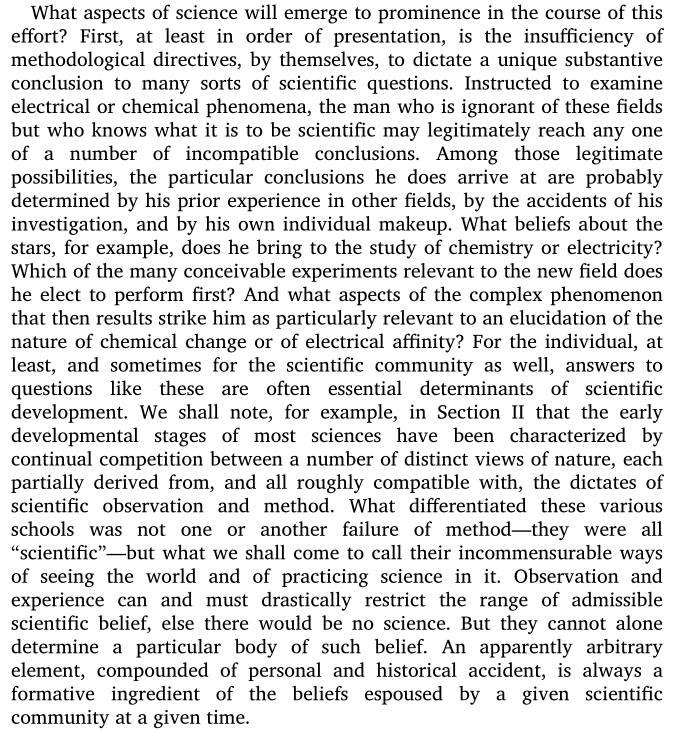


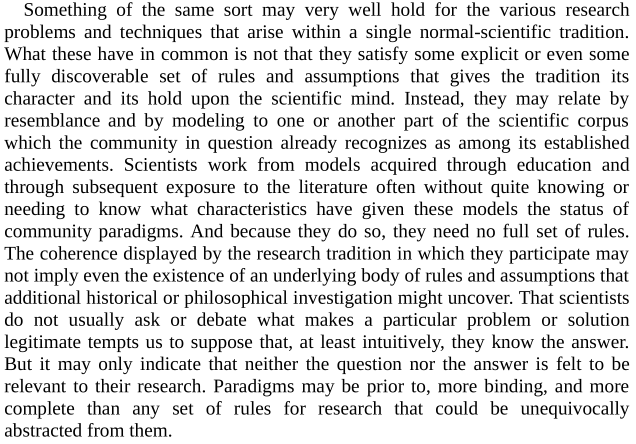
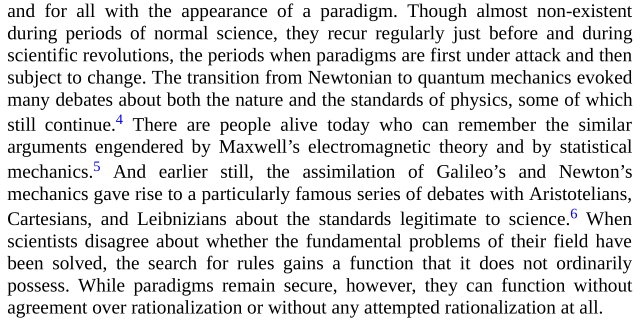
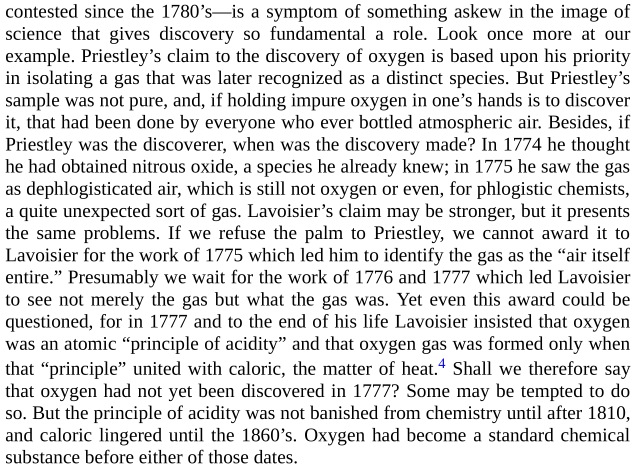
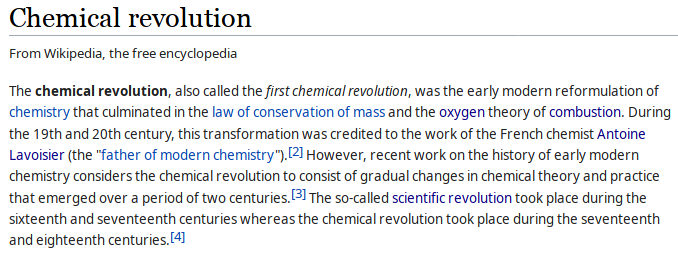
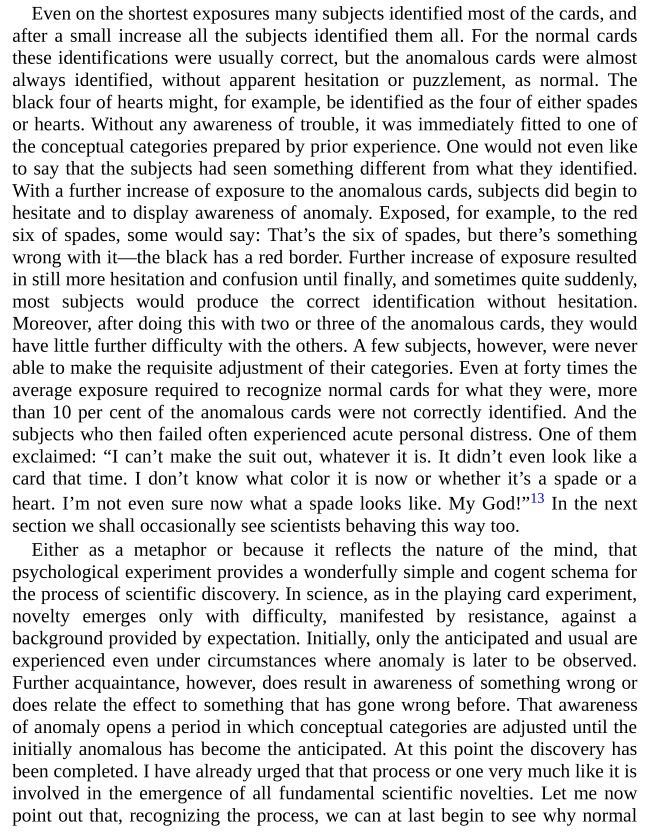

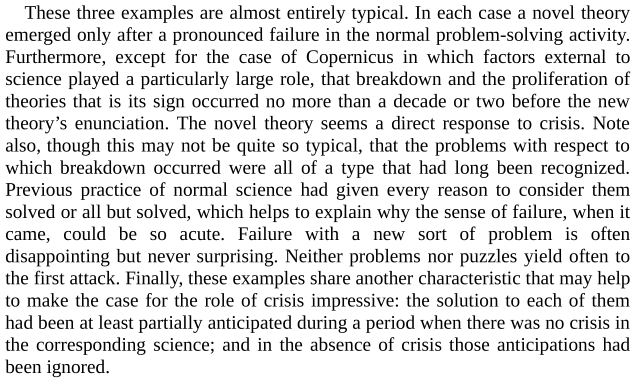
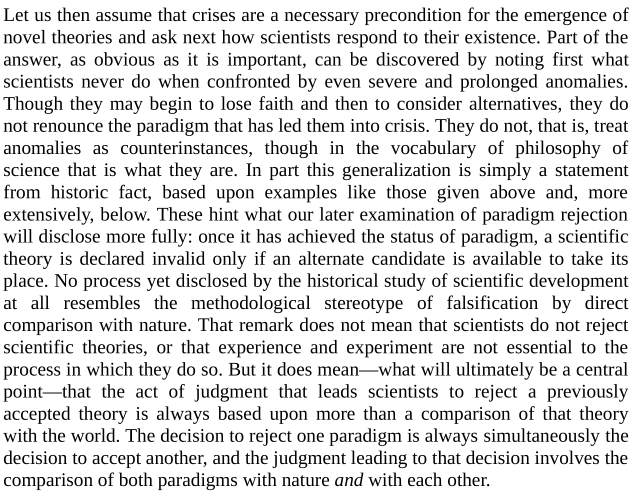
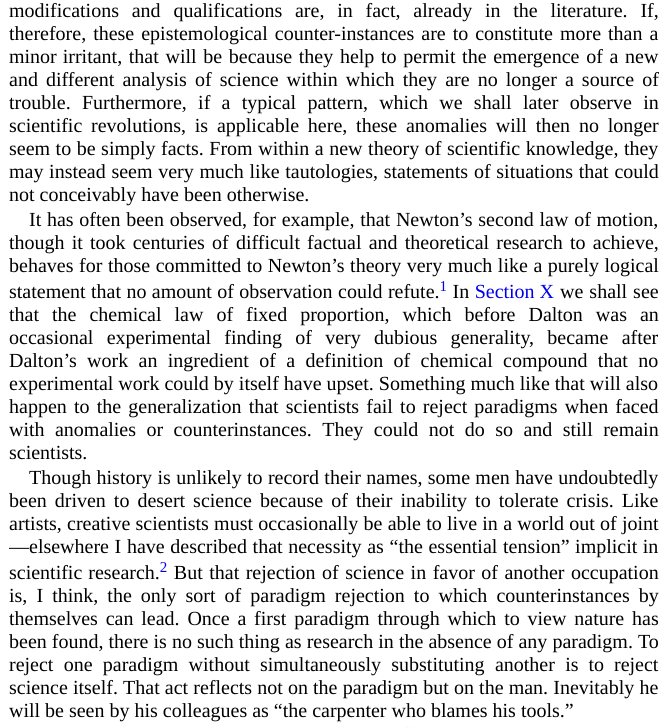

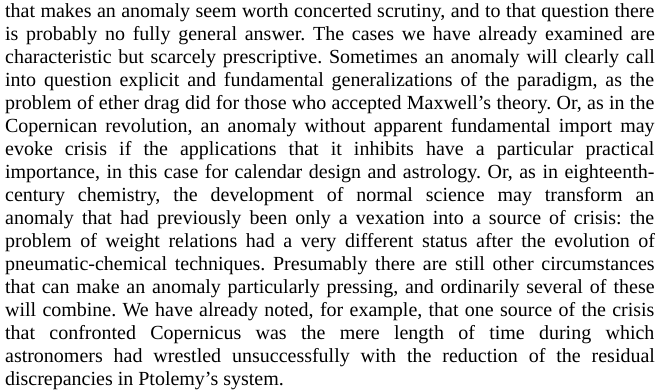
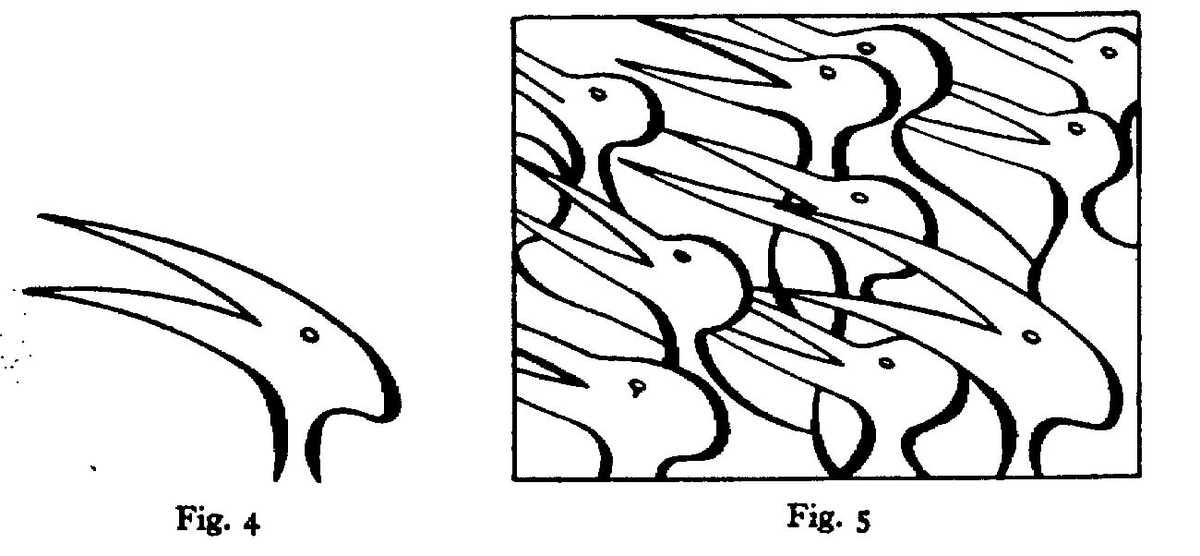
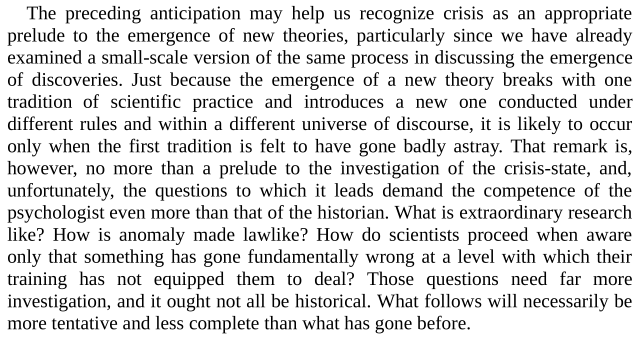
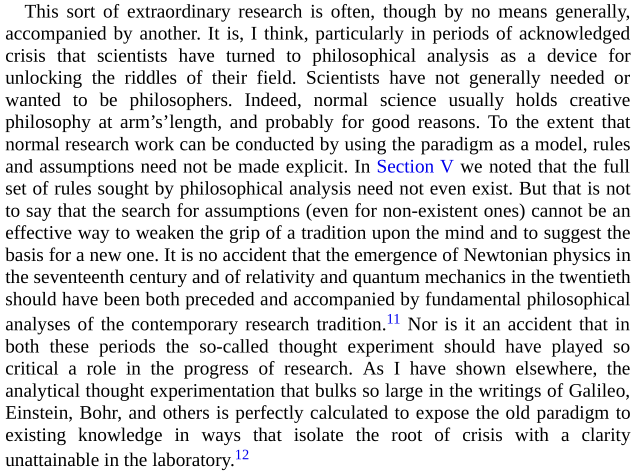
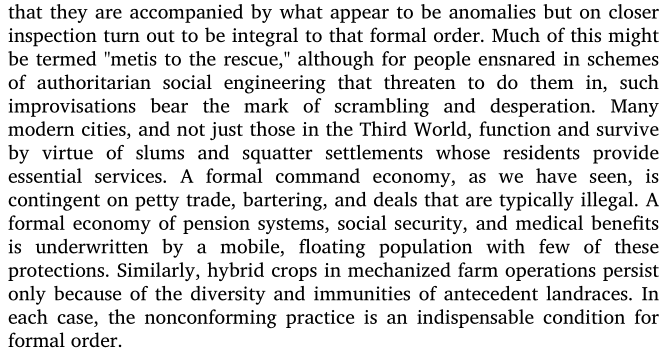
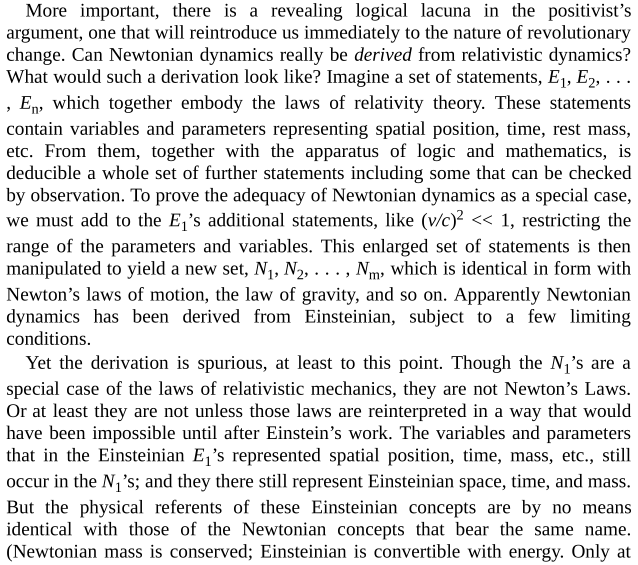
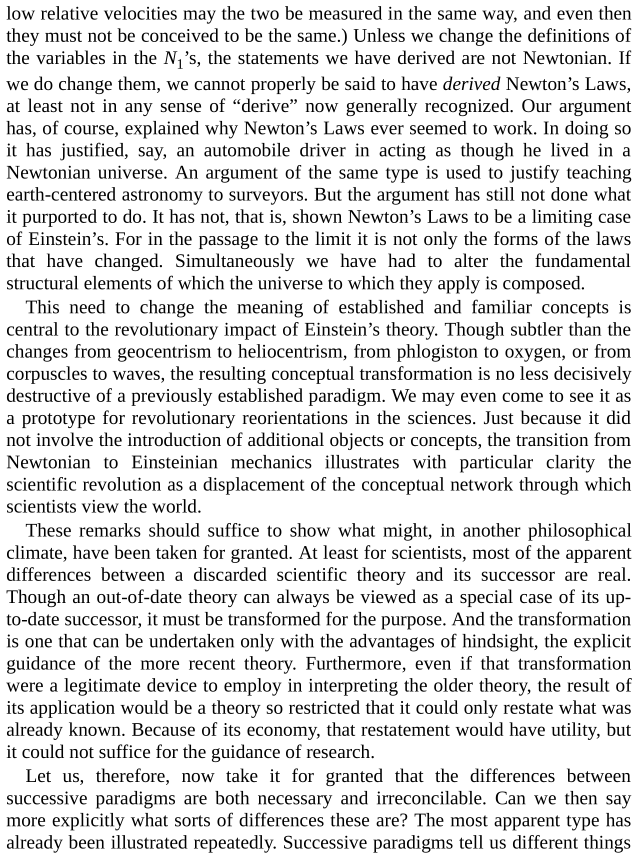


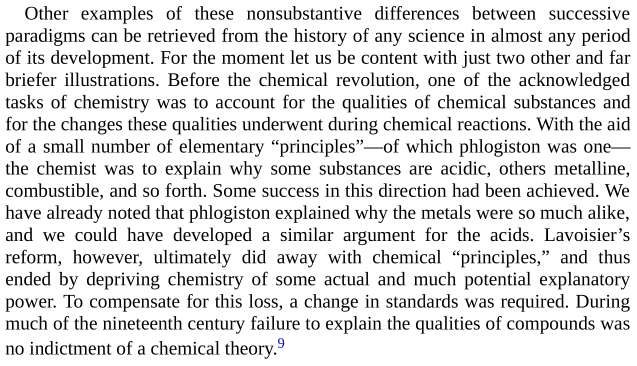


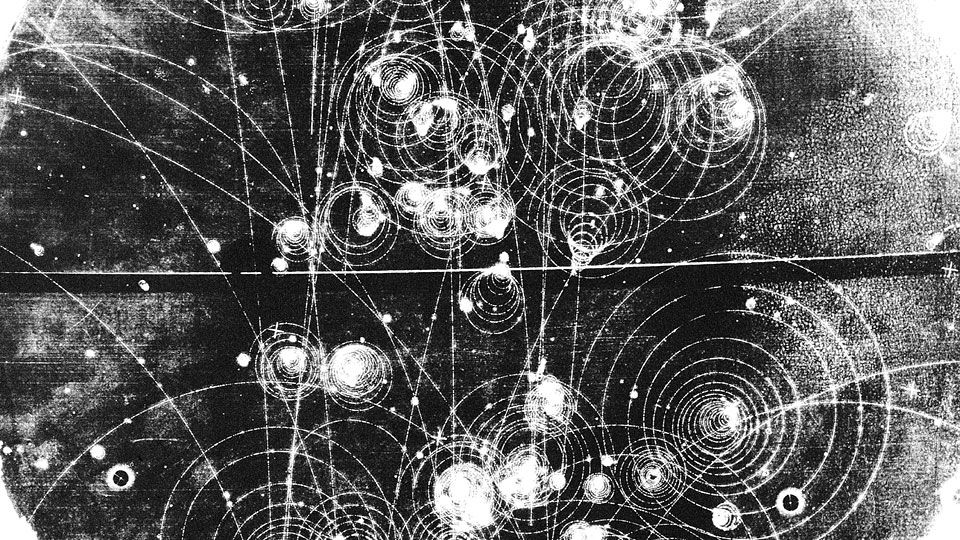 https://en.wikipedia.org/wiki/Clou..." title="Likewise, looking at a bubble-chamber photograph, a student sees only confused and broken lines. A physicist sees a record of familiar subnuclear events. https://en.wikipedia.org/wiki/Bubb... href=" https://en.wikipedia.org/wiki/Cloud_chamber">https://en.wikipedia.org/wiki/Clou..." class="img-responsive" style="max-width:100%;"/>
https://en.wikipedia.org/wiki/Clou..." title="Likewise, looking at a bubble-chamber photograph, a student sees only confused and broken lines. A physicist sees a record of familiar subnuclear events. https://en.wikipedia.org/wiki/Bubb... href=" https://en.wikipedia.org/wiki/Cloud_chamber">https://en.wikipedia.org/wiki/Clou..." class="img-responsive" style="max-width:100%;"/>
 ) that those astronomers first saw a comet, then decided it that based on its motion it must be a planet." title="He goes into the example of Uranus. Seventeen different times, august astronomers saw what we now know was Uranus. But it wasn& #39;t until new technology (better https://abs.twimg.com/emoji/v2/... draggable="false" alt="🔭" title="Teleskop" aria-label="Emoji: Teleskop">) that those astronomers first saw a comet, then decided it that based on its motion it must be a planet." class="img-responsive" style="max-width:100%;"/>
) that those astronomers first saw a comet, then decided it that based on its motion it must be a planet." title="He goes into the example of Uranus. Seventeen different times, august astronomers saw what we now know was Uranus. But it wasn& #39;t until new technology (better https://abs.twimg.com/emoji/v2/... draggable="false" alt="🔭" title="Teleskop" aria-label="Emoji: Teleskop">) that those astronomers first saw a comet, then decided it that based on its motion it must be a planet." class="img-responsive" style="max-width:100%;"/>
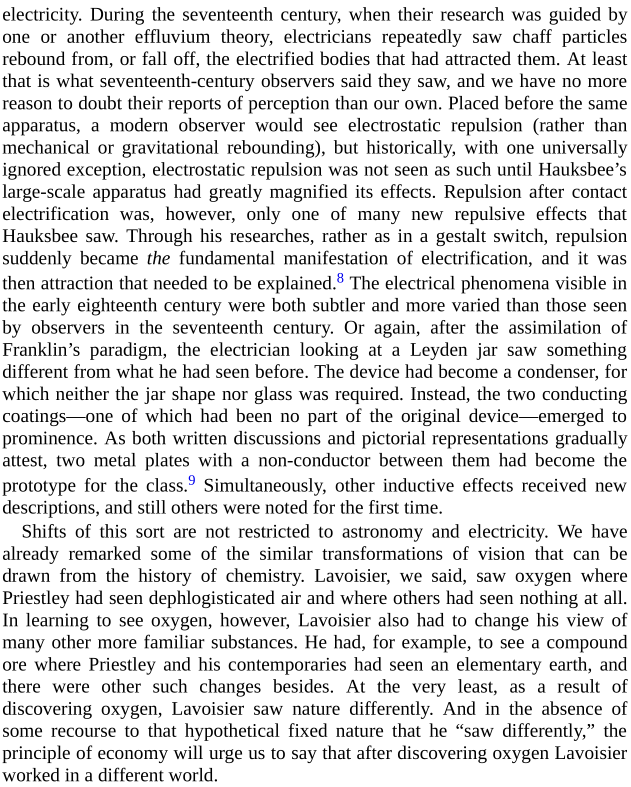
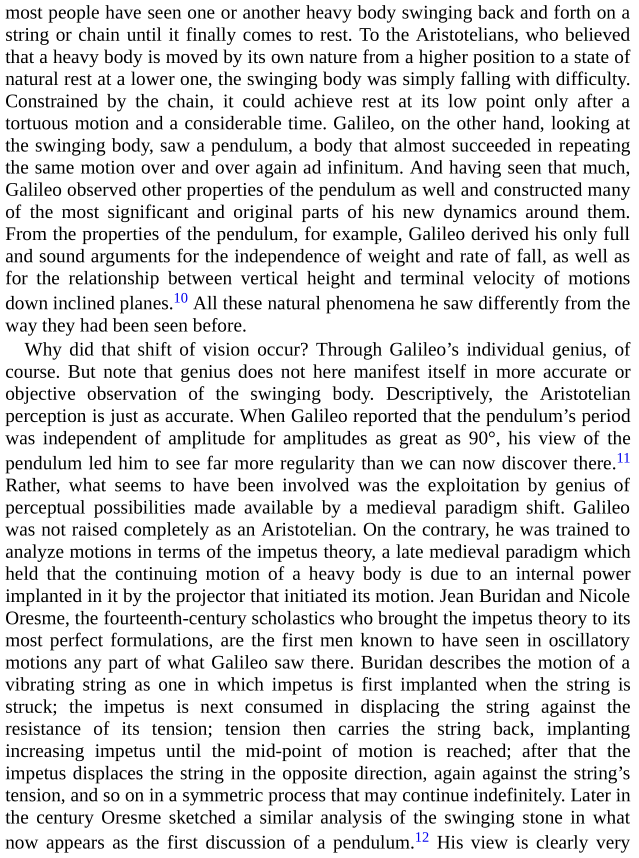
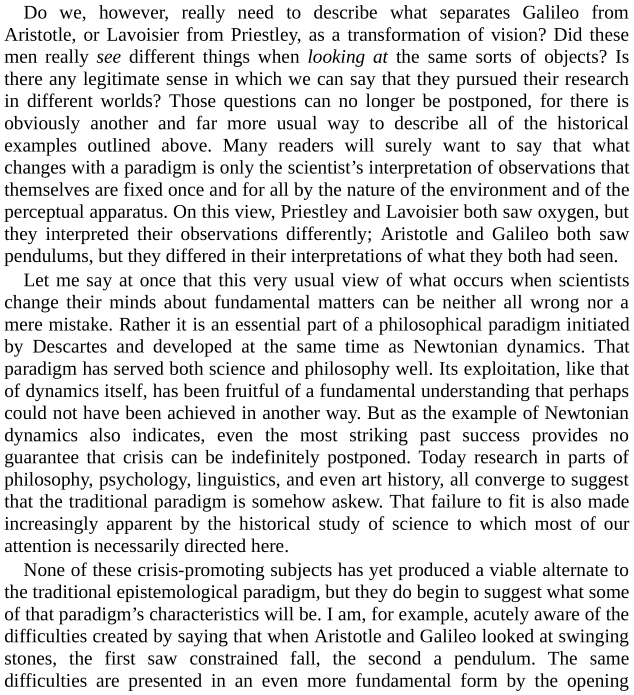
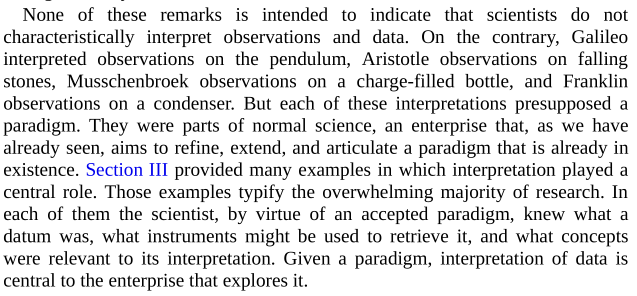

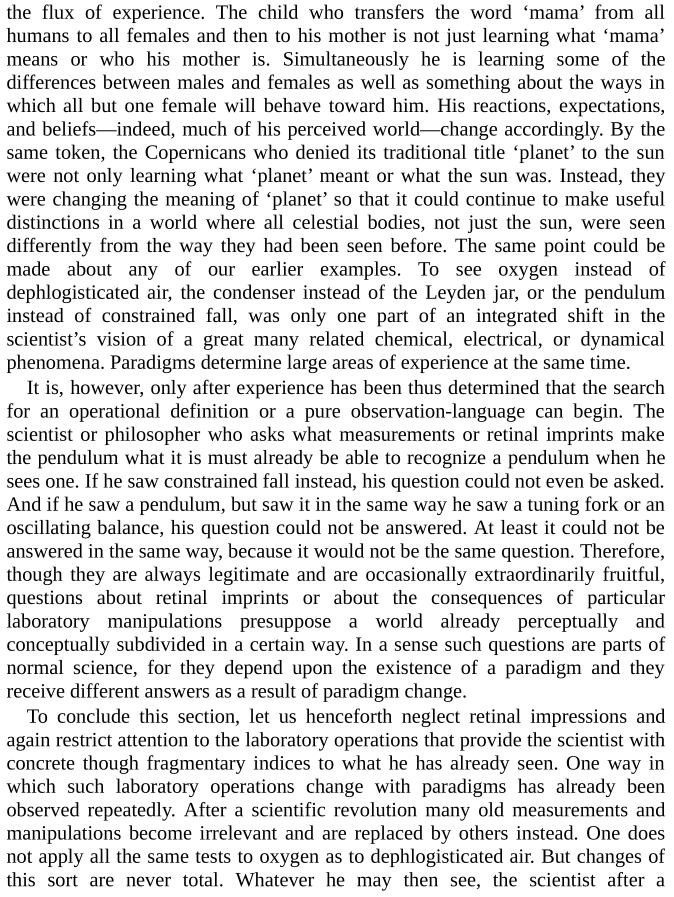
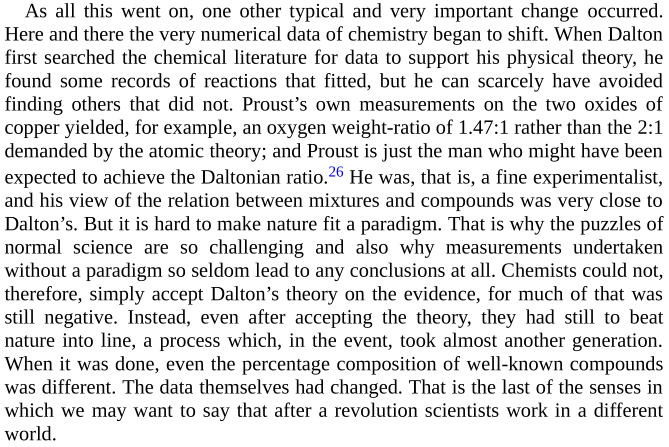
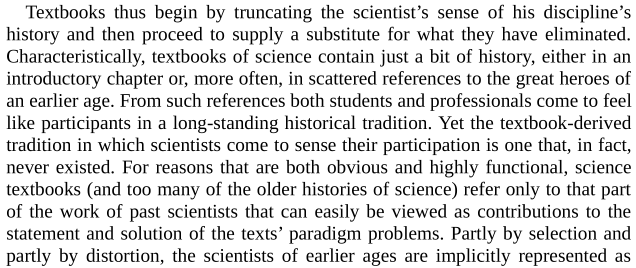 Kuhn& #39;s assonance as he explains how tradition presents a fiction." title=""Textbooks thus begin by truncating the scientist& #39;s sense of his discipline& #39;s history and then proceed to supply a substitute for what they have eliminated."Brilliant, incisive, and sibilant as well! I https://abs.twimg.com/emoji/v2/... draggable="false" alt="❤️" title="Rotes Herz" aria-label="Emoji: Rotes Herz"> Kuhn& #39;s assonance as he explains how tradition presents a fiction." class="img-responsive" style="max-width:100%;"/>
Kuhn& #39;s assonance as he explains how tradition presents a fiction." title=""Textbooks thus begin by truncating the scientist& #39;s sense of his discipline& #39;s history and then proceed to supply a substitute for what they have eliminated."Brilliant, incisive, and sibilant as well! I https://abs.twimg.com/emoji/v2/... draggable="false" alt="❤️" title="Rotes Herz" aria-label="Emoji: Rotes Herz"> Kuhn& #39;s assonance as he explains how tradition presents a fiction." class="img-responsive" style="max-width:100%;"/>
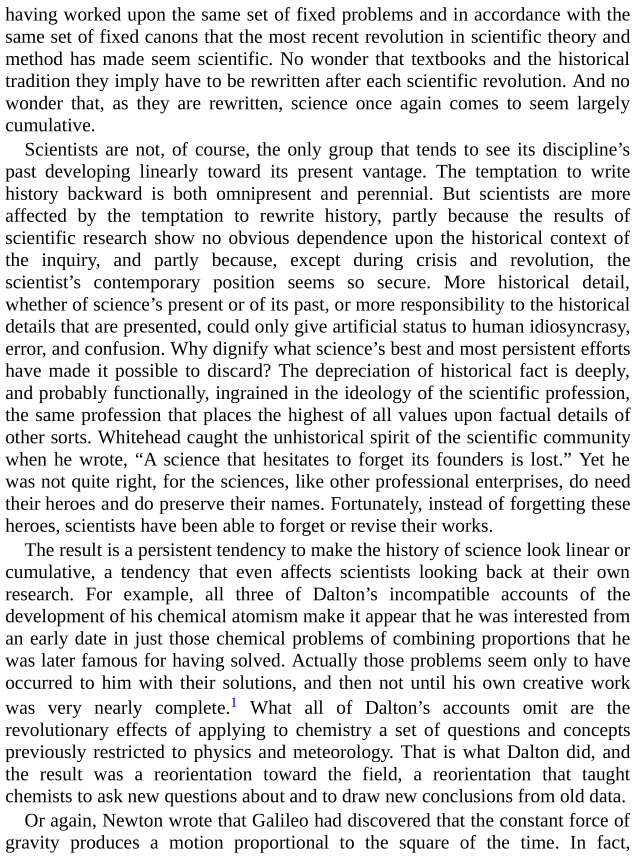
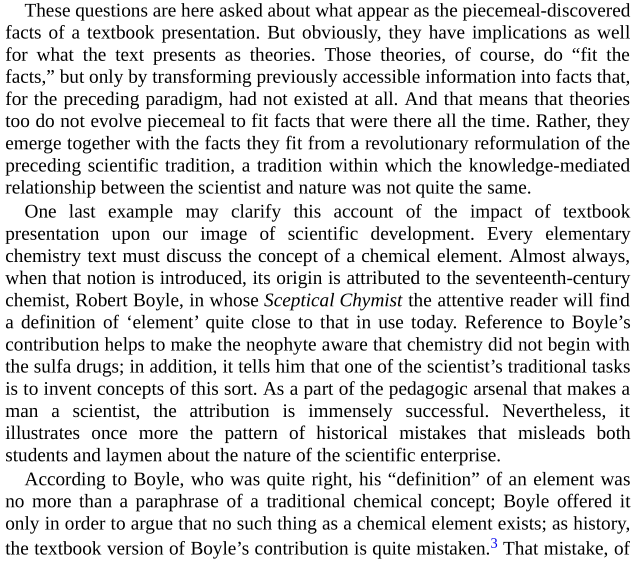
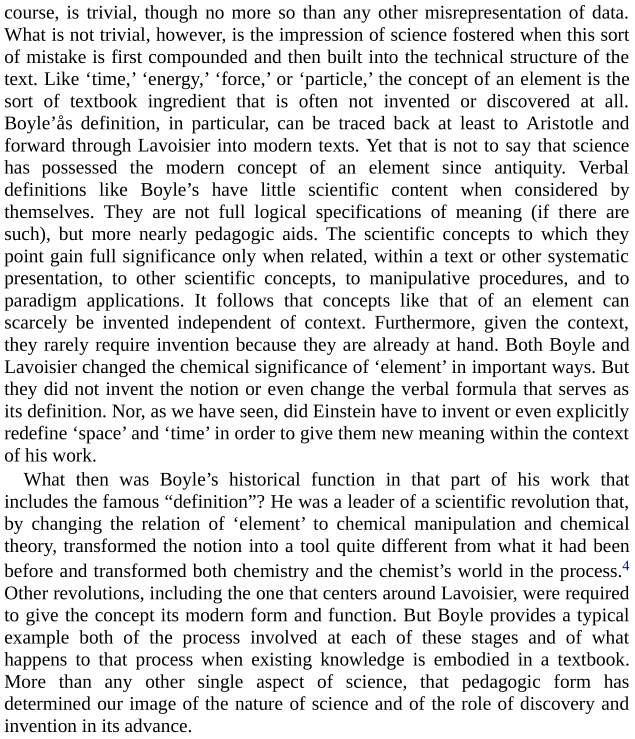
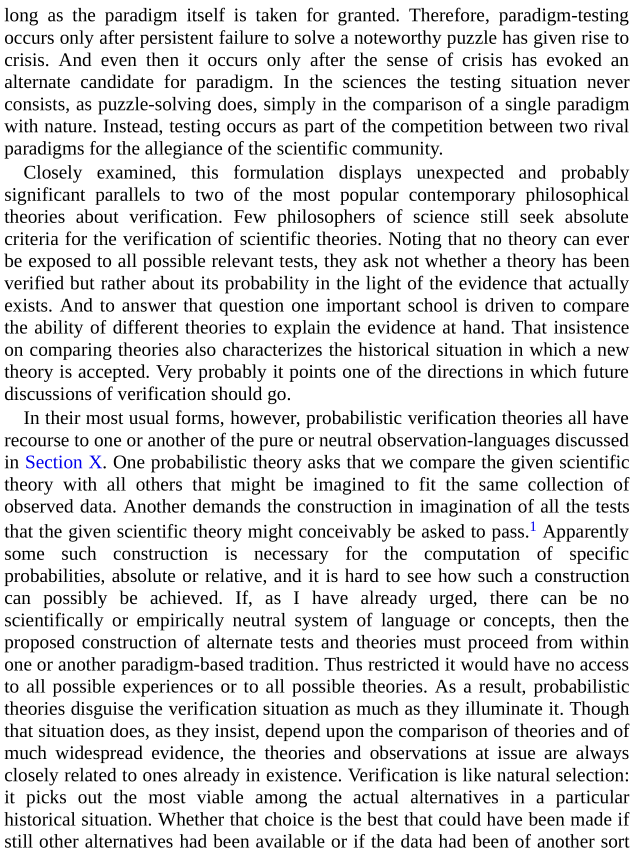
 https://twitter.com/bryankam/..." title="Now Kuhn directly addresses Popper, vs the above probabilistic verification theories. @dela3499 @haideralmosawi There is no direct comparison between theories and nature, but you can compare theories to each other. https://twitter.com/bryankam/... href=" https://twitter.com/bryankam/status/1321051364999516161">https://twitter.com/bryankam/...">
https://twitter.com/bryankam/..." title="Now Kuhn directly addresses Popper, vs the above probabilistic verification theories. @dela3499 @haideralmosawi There is no direct comparison between theories and nature, but you can compare theories to each other. https://twitter.com/bryankam/... href=" https://twitter.com/bryankam/status/1321051364999516161">https://twitter.com/bryankam/...">
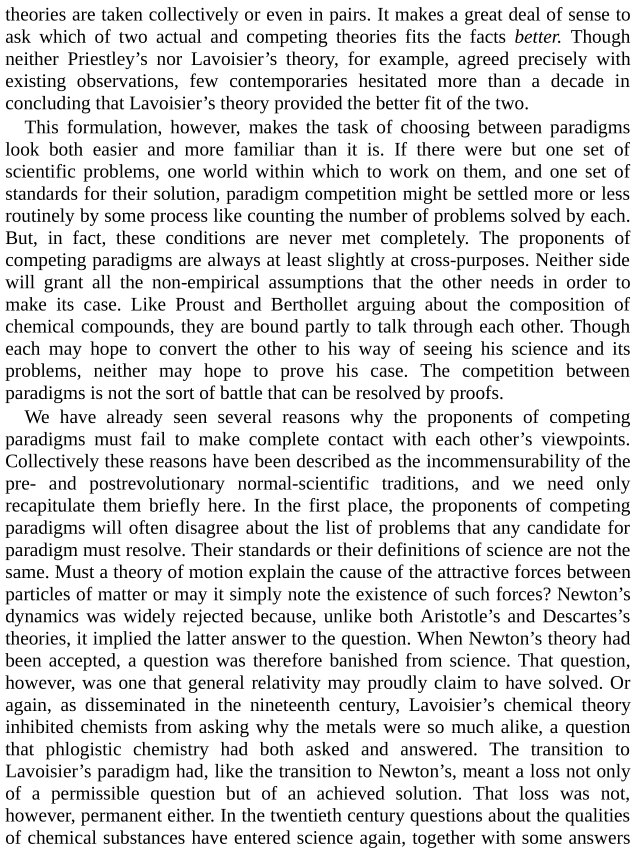 https://twitter.com/bryankam/..." title="Now Kuhn directly addresses Popper, vs the above probabilistic verification theories. @dela3499 @haideralmosawi There is no direct comparison between theories and nature, but you can compare theories to each other. https://twitter.com/bryankam/... href=" https://twitter.com/bryankam/status/1321051364999516161">https://twitter.com/bryankam/...">
https://twitter.com/bryankam/..." title="Now Kuhn directly addresses Popper, vs the above probabilistic verification theories. @dela3499 @haideralmosawi There is no direct comparison between theories and nature, but you can compare theories to each other. https://twitter.com/bryankam/... href=" https://twitter.com/bryankam/status/1321051364999516161">https://twitter.com/bryankam/...">
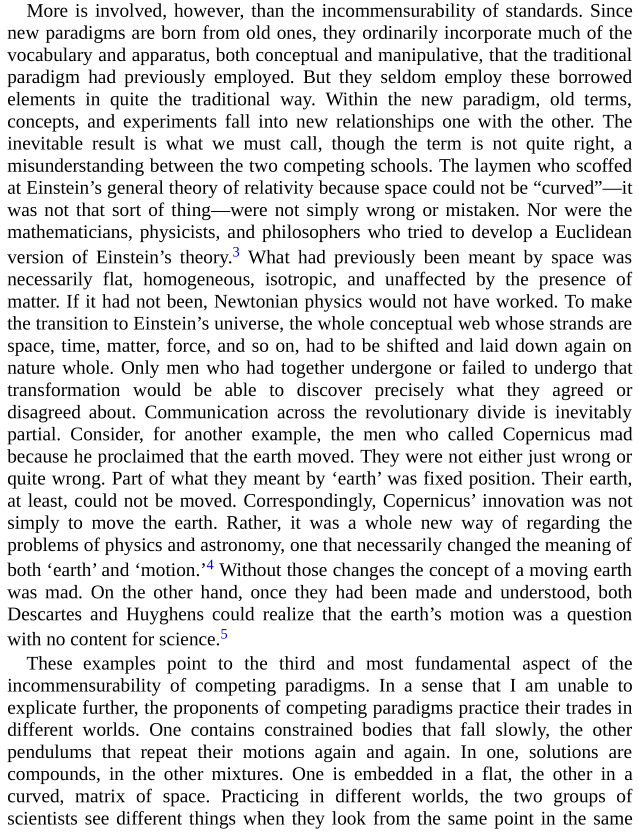
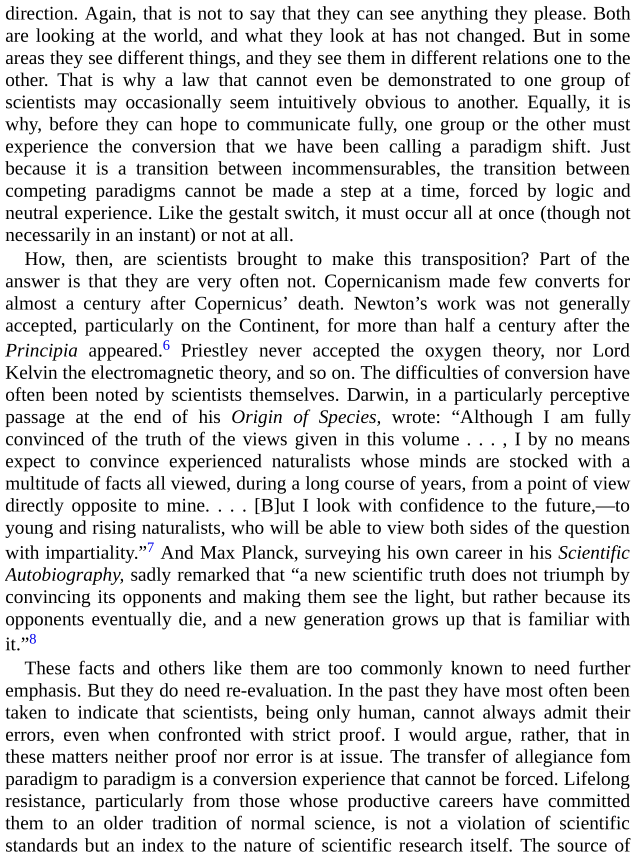
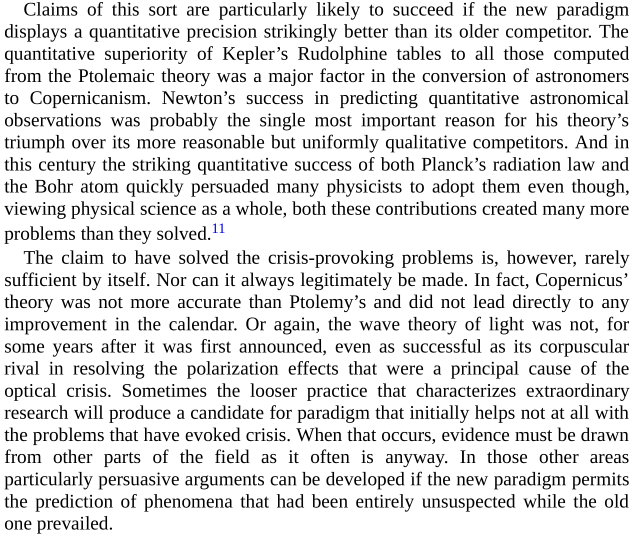
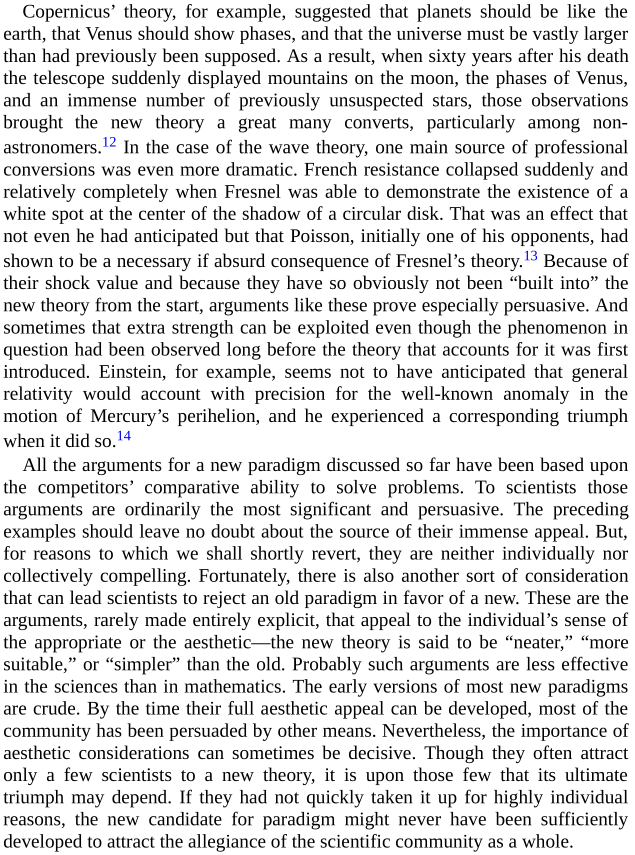
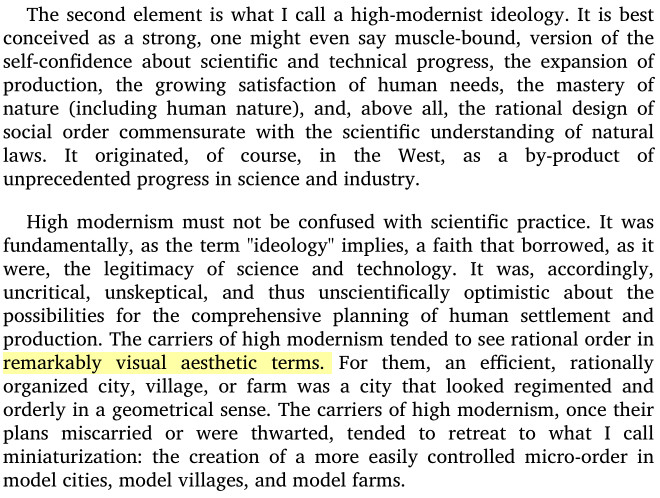

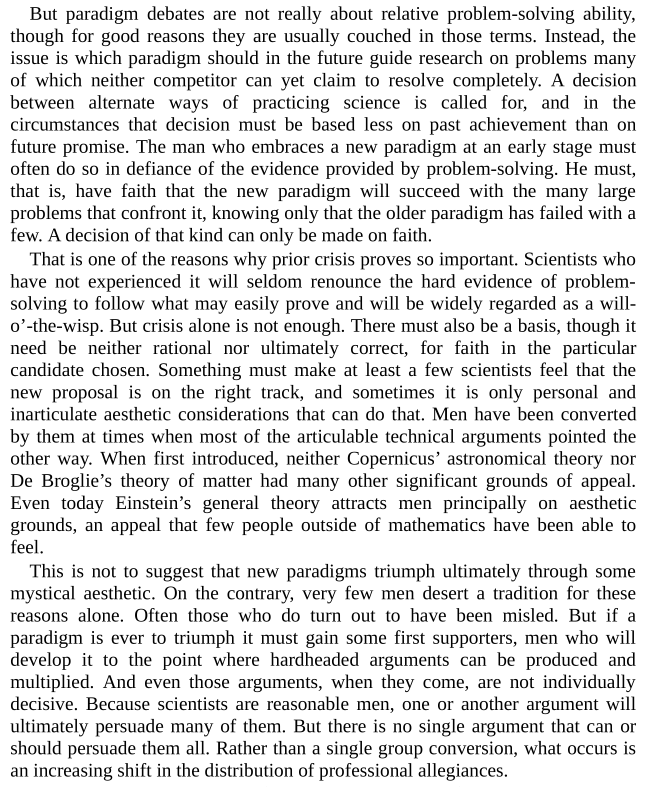
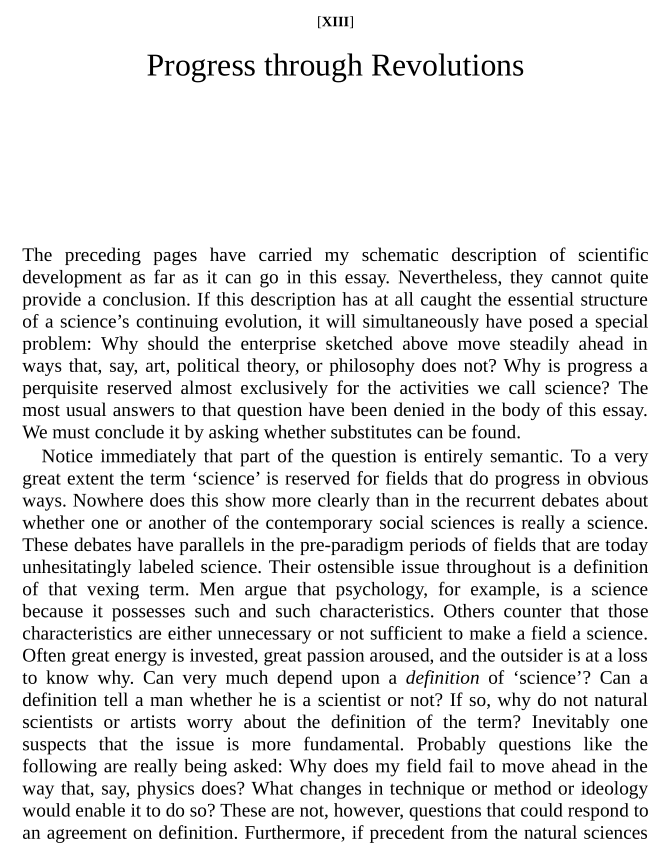
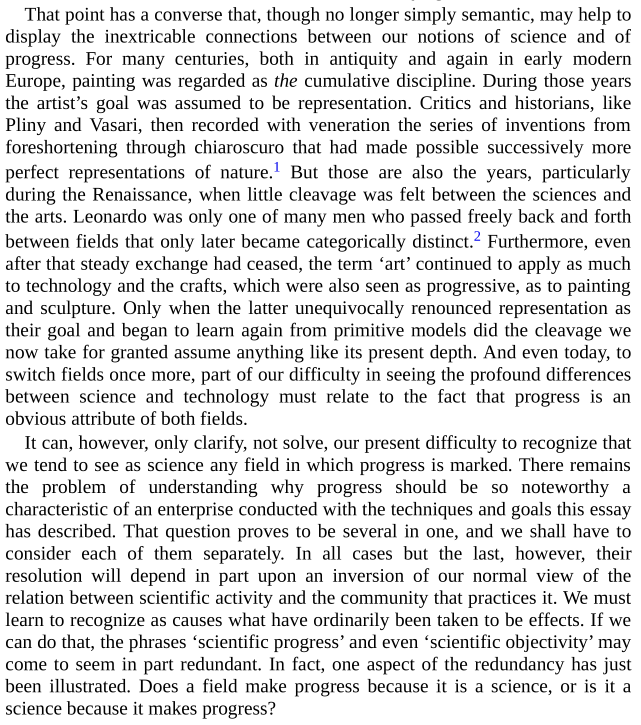 https://abs.twimg.com/emoji/v2/... draggable="false" alt="🔬" title="Mikroskop" aria-label="Emoji: Mikroskop">" title="This is so mind-blowing that I have to quote it. Kuhn argues that in antiquity and the Renaissance, painting was regarded as _the_ cumulative discipline. It progressed like a science. And in those years, science was not differentiated from art.https://abs.twimg.com/emoji/v2/... draggable="false" alt="🖼️" title="Bilderrahmen mit Bild" aria-label="Emoji: Bilderrahmen mit Bild">https://abs.twimg.com/emoji/v2/... draggable="false" alt="🔬" title="Mikroskop" aria-label="Emoji: Mikroskop">" class="img-responsive" style="max-width:100%;"/>
https://abs.twimg.com/emoji/v2/... draggable="false" alt="🔬" title="Mikroskop" aria-label="Emoji: Mikroskop">" title="This is so mind-blowing that I have to quote it. Kuhn argues that in antiquity and the Renaissance, painting was regarded as _the_ cumulative discipline. It progressed like a science. And in those years, science was not differentiated from art.https://abs.twimg.com/emoji/v2/... draggable="false" alt="🖼️" title="Bilderrahmen mit Bild" aria-label="Emoji: Bilderrahmen mit Bild">https://abs.twimg.com/emoji/v2/... draggable="false" alt="🔬" title="Mikroskop" aria-label="Emoji: Mikroskop">" class="img-responsive" style="max-width:100%;"/>
